






By Jeremy Allen, Executive Editor
By Ebony JJ Curry SENIOR REPORTER
As Executive Editor of the Michigan Chronicle, I want to address an error that appeared in last week’s edition in the article titled, “Melvin ‘Butch’ Hollowell Leads Mayor-Elect Sheffield’s ‘Community-Centered’ Transition.” In that story, we misspelled Mr. Hollowell’s last name. We sincerely regret this mistake.
Late Thursday night, Sept.
Mr. Hollowell is a respected leader whose long record of public service deserves to be represented with accuracy and care. Getting his name wrong falls short of the standards we set for ourselves and the expectations our readers rightfully hold, and I take full responsibility for the oversight.
By Ebony JJ Curry
SENIOR REPORTER
14, a historic moment unfolded in American labor relations as the United Auto Workers (UAW) union initiated a strike against Ford, General Motors (GM), and Stellantis. For the first time, the union took simultaneous action against all three major Detroit-based automakers. The action involves approximately 13,000 UAW members in assembly plants across Michigan, Ohio, and Missouri, who walked off their jobs after existing labor contracts expired at 11:59 p.m.
Michigan Chronicle has served Detroit and its surrounding communities for generations, and our mission has always been rooted in trust, clarity, and editorial excellence. Errors like this remind us that accuracy is a core part of how we honor the people and stories we cover, and it is so much more than just a professional obligation.
IWe appreciate our readers’ continued support and thank Mr. Hollowell for his understanding as we reaffirm our commitment to the highest journalistic standards.
n a breathtaking celebration of talent, determination, and the unyielding spirit of Black excellence, the Michigan Chronicle marked its 10th Annual 40 Under 40 event Thursday evening. This year’s soirée, drenched in the theme “All Black Everything with Gold Accents,” transcended expectations and essentially illuminated the golden gems within the true essence of Black excellence. Hosted by the charismatic duo of Andre Ash and Lynzee Mychael from Michigan Chronicle’s Finally Friday, the night was a triumph for the city of Detroit and its vibrant community of young Black professionals.
By Jeremy Allen EXECUTIVE EDITOR
Shortly before midnight on Sept. 14, GM released a statement expressing disappointment with the strike action, despite offering what it termed an “unprecedented economic package” that included historic wage increases. Stellantis also expressed disappointment in a statement, saying the company immediately went into contingency mode to protect its operations.

received the prestigious Entrepreneur of the Year Award. Brown’s commitment to empowering the city through fashion and entrepreneurship has left an indelible mark.
Had 1.4 Million
The evening sparkled with a golden promise as we celebrated remarkable individuals from various walks of life. Among the honorees were the brilliant and visionary co-founders of Detroit Hives, Nicole Lindsey and Timothy Paul Jackson. Their work has not only changed the landscape of beekeeping and urban farming in Detroit but also exemplified the transformative impact Black professionals can have on their communities.
By Sam Robinson SENIOR REPORTER
“Entrepreneur of the year – that’s a big deal,” said Brown. “It’s always an honor to be honored and it’s always a blessing to be in a room full of so many talented, accomplished, and popular people that look like me. I’m geeked. I started making and selling clothes as a kid and I always knew that I would have a business, but I never knew it would be Detroit’s brand name business, so I take a lot of pride in the fact that our business represents our city’s pride.”
trative positions from residents interested in joining her administration.
DPD Chief James White Says Increased Police Presence Culled Violence
verse voices and is ready to deliver bold, community-driven results from day one,” the group said in a release.
Taking home the Corporate Excellence Award was Dannis Mitchell, Director of Community Engagement at Barton Malow.
By Ebony JJ Curry SENIOR REPORTER
A bold new chapter for connection, collaboration, and culture is taking shape in downtown Grand Rapids, and the Michigan Chronicle will be part of it. Plans were unveiled this week for the Commerce Club, a new private city club designed to bring together business leaders, entrepreneurs, and community influencers from across West Michigan.
“Together we have created a social, environmental, and financial impact through bees,” said Jackson. Lindsey followed that sentiment with, “It is through our local partnerships and collaborative efforts that we exist in over 28 plus locations managing the health of 4.5 million honeybees – humbly speaking our movement has inspired others locally, nationally, and even internationally to take on similar missions.”
Detroit Mayor-elect Mary Sheffield’s transition team, Rise Higher Detroit, announced last week that it will identify best practices through more than a dozen policy committees, all of which will be chaired by local civic and community leaders.
ness district that had been the lifeblood of the community.
“Which I believe is a testament to the excitement that people have in shaping the future. our city, and also a belief in creating the Detroit that works for everyone,” Sheffield said.
At the podium, Sheffield called the process the boldest, most rigorous and inclusive transition plan in the city’s history.
towards mending the wounds inflicted on Black Detroiters and restoring a sense of belonging that was so callously torn away in the past.
The UAW has branded the industrial action as the “Stand-Up Strike,” focusing on specific plants within each automaker. UAW President Shawn Fain stated, “This strategy will keep the companies guessing. It will give our national negotiators maximum leverage and flexibility in bargaining. And if we need to go all out, we will. Everything is on the table.” Union leaders have also indicated that additional plants could be targeted in future waves if negotiations
For many Detroiters, Interstate 375, or I-375, has long been just another stretch of urban highway, a concrete artery connecting different parts of the city. To some, it’s a mere convenience; to others, it’s an unremarkable part of their daily commute. However, there’s a deeper, far more troubling story beneath the surface of this seemingly ordinary freeway—a story of pain, displacement, and the lasting impact on Black Detroiters.
The initiative marks a strategic partnership for Real Times Media, the Detroit-based parent company of the Michigan Chronicle, as it expands the paper’s presence on the west side of the state through new storytelling and event opportunities.
The transition team’s co-chairs –leaders in finance, neighborhood revitalization, environment, education, transit, and public safety – are tasked with making recommendations to Sheffield’s first 100day plan.
Detroit Hives, a pioneering organization founded by Lindsey and Jackson, harnesses the power of urban beekeeping to revitalize neighborhoods in the Motor City. Their initiative not only addresses critical issues like environmental conservation but also provides valuable education and employment opportunities to Black De-
“It is so important to recognize that there are young leaders across the country, many that are born here in Detroit. I represent our city nationally and I tell people, ‘Yea I’m a D-girl I’m from the west-side of Detroit,’” Mitchell expressed. “But more importantly, I’ve been able to have experiences within an industry that not many of us, specifically women of color, have the opportunity to engage in and I’ve been the youngest person in the room, the only Black person in the room, and the only Sistah in the room, and I really had to articulate the importance of showing up, giving chances when others won’t, and being persistent.” As a trailblazing Black woman thriving in a predominantly male-dominated industry, her unwavering commitment to fortifying the connections between businesses and Detroit’s communities is unde-
It’s a history marred by pain, injustice, and economic devastation. More than 130,000 residents, primarily Black, were forcibly displaced. Families were uprooted, generational wealth was obliterated, and a thriving community was torn asunder. The wounds inflicted by I-375 run deep, transcending the physical barrier of a freeway to penetrate the very soul of Black Detroiters.
Rise Higher Detroit is led by Butch Hollowell, who is the managing partner of The Miller Law Firm Detroit a former corporation counsel for the City of Detroit.
Hollowell said Rise Higher will be onboarding a chief talent officer that will do vetting and outreach.to ensure Sheffield’s cabinet is made up of the best talent in the United States.
A string of shootings in Greektown in mid-April left both visitors and residents of this bustling downtown destination in awe. One of these shootings tragically claimed the life of a popular and beloved security guard following a dispute with a patron.
The I-375 Boulevard Project is about more than just correcting historical injustices; it’s about redefining the future. It will connect downtown Detroit to surrounding neighborhoods, bridging the gap that was placed upon the city decades ago.
“These co-chairs reflect the best of Detroit — people who lead with heart, vision and a deep belief in what’s possible for our city. Their work will shape our transition priorities, inform our policies and ensure that every decision we make as a city is rooted in partnership and the collective voice of our people.”

Community activist Teferi Brent said he’s never seen a coalition with members that touch more areas of civic life than the one Sheffield assembled ahead of her mayoral tenure, which begins Jan. 1. Brent is a co-chair for Rise Higher’s public safety committee, along with former Detroit Police Department chief James White.
This painful legacy can be traced back to the nation’s interstate highway program of 1956—a program that aimed to connect the country but often did so at the expense of marginalized communities. In the case of I-375, it meant carving a path through the heart of Black Detroit, reinforcing segregation, and perpetuating inequality.
By Andre Ash
DIGITAL ANCHOR
“I’ve always known Butch to be a doer,” Sheffield told Michigan Chronicle when asked why she selected Hollowell to lead her transition team. “He was one of the first people that reached out to me throughout this process with advice and guidance… I’m honored to have him.”
The male suspect allegedly shot the guard before fleeing the scene, while his female companion is accused of concealing the weapon in her bra.
Eastside Community Network CEO and president Donna Givens Davidson said being selected to serve on the transition team is an honor to those who have been doing community development work for years.
These incidents unfolded during an unseasonably warm spring, leading to increased pedestrian traffic and heightened tensions in the densely populated downtown area.
RTM CEO and Michigan Chronicle publisher Hiram Jackson, a co-founder and investor in the Commerce Club, said the partnership represents a natural progression for the company’s growth and engagement across Michigan.
The tale begins in what is now Lafayette Park, once known as Black Bottom—a neighborhood rooted in African-American culture and history. Named after its dark, fertile soil, Black Bottom flourished during the mid1900s, nurturing the dreams and aspirations of prominent Detroiters like Coleman Young, Joe Louis, and numerous other Detroit legends. But in the name of urban renewal in the 1950s, this vibrant neighborhood was systematically dismantled, erased from the map, and replaced by a lifeless stretch of asphalt.
The first convening of the committee chairs were held Thursday, Nov. 13, at Marygrove Conservancy, the headquarters of the Rise Higher Detroit transition initiative.
A Holistic Approach to Providing Shelter and Support for Detroit’s Unhoused People
For one to aptly recognize the harm caused by such projects, it is vital to note that some of the planners and politicians behind those projects built them directly through the heart of vibrant, populated communities—oftentimes to reinforce segregation and sometimes as part of a direct effort to replace or eliminate Black neighborhoods.
Huntington Bank CEO Gary Torgow, a co-chair of the workforce, economic development and small business committee told reporters Thursday that he expects Sheffield to be a historic leader for more than one term as mayor.
Today, the resurgence of Paradise Valley stands as a testament to the indomitable spirit of Black Detroiters and the enduring legacy of Black excellence. This historic district, once a vibrant hub for Black businesses and culture, is experiencing a renaissance that harkens back to its glory days. The destruction of Black Bottom may have torn apart a thriving community, but the resolute determination of a new generation of entrepreneurs and visionaries is reclaiming that lost legacy.
“I am a descendent of a long line of strong women who’ve never really had an opportunity to lead at this level, and so that’s an honor,” Givens Davidson said.
The surge in crime and the influx of visitors to Detroit’s downtown core garnered the attention of the Detroit Police Department (DPD), catching them somewhat off guard.
Givens Davidson will serve as co-chair of Housing Development & Planning with Rob Lockett, the executive director of Lisc Detroit.
“We’ve built relationships in Grand Rapids for years and watched with great admiration the entrepreneurial ethos and underdog mentality of this community,” Jackson said. “When the Commerce Club opportunity arose, we knew it was the time and place to invest in the West side.”
Fain clarified the union’s strategy: “I want to give a major shoutout to the thousands of members who are on the picket lines right now fighting for all of us. The Stand-Up Strike is a new approach to striking. Instead of striking all plants at once, select locals will be called on to stand up and walk out on strike. This is our generation’s answer to the movement that built our union – the sit-down strikes of 1937. We told the Big 3 that Sept. 14 was the deadline and we meant it. We gave the companies our economic demands eight weeks ago and it took more than a month to get to the table.”
While the residential areas bore the brunt of this demolition, the heart of Black Bottom, its thriving business center, remained largely untouched. Restaurants, theaters, clubs, and bars—the very places that brought Detroit’s Black community together—were concentrated around Hastings Street, the epicenter of African-American culture in the city.
Located in the historic 61 Commerce building, the six-floor, 30,000-square-foot private
The union is pushing for a comprehensive list of demands. This
Homelessness continues to plague urban communities, with families and individuals grappling with the challenges of making ends meet in today’s economic climate. Whether it’s struggling to meet monthly mortgage payments or coping with soaring rental costs in a housing market marked by shockingly high prices, a variety of factors contribute to the growing issue of people becoming unhoused.
Mayor-elect Sheffield’s decision to headquarter her transition at Marygrove marks the first time a mayoral transition team has done its work in one of Detroit’s neighborhoods, she said.
Keeping a focus on the city’s neighborhoods, not just what’s happening in the growing downtown, was a key part of Sheffield’s pitch to voters throughout her campaign.
Meagan DunnJulie Schneider
Then, in a cruel twist of fate, Hastings Street, too, was obliterated a few years later, making way for the construction of I-375. This marked the final blow, sealing the fate of Black Bottom and signaling the beginning of the end for Paradise Valley, the Black busi-
Housing Resource Helpline in response to the challenges that residents face in navigating the complex system of housing services. The helpline provides a single point of contact for people seeking housing assistance and connects them with the resources they need.
But now, after decades of enduring the scars of I-375, there is a glimmer of hope on the horizon. Plans have been unveiled to transform this once-divisive freeway into a vision that seeks to right the wrongs of the past while heralding a new era of inclusivity and community revitalization.
Sheffield told reporters during a press conference Thursday morning more than 795 resumes were received for adminis-
Historically, shelters have provided a temporary respite for those in need, often serving as the first or second option after exhausting alternatives like staying with friends or family. Shelters offer a place to rest one’s head and a warm meal, albeit sometimes for extended periods. For others, being unhoused means living in cars or makeshift outdoor
“She will be a historic leader of Detroit for decades,” Torgow said. The bank executive referenced the historic nature of her election win as the first woman to do it, and by such a large margin.
Support for the helpline comes from the Gilbert Family Foundation, which has pledged $10 million over three years to fund the program. Wayne Metro Community Action Agency manages the helpline, making it accessible to all Detroit residents. This initiative simplifies access to the City’s various housing services, ensuring that residents in need can easily find assistance.
In total, 18 policy committees will support the Rise Higher Detroit transition initiative which will meet regularly each week through the end of this year.
James White, Chief of Police for the Detroit Police Department, said: “We were caught somewhat flat-footed right out the gate. By design we went into the spring deployment, which is less than the mid-summer deployment, and saw we say an uptick in violence that first warm weekend.”
Nicole Sherard Freeman, CEO and president of the Community Foundation for Southeast Michigan, said Sheffield has made it crystal clear she will be inviting the ideas of all and centering the input of Detroit residents.
Chief White attributes the violence in Greektown to a combination of weather conditions and a surge in population.
Fueled by more than $100 million from the Infrastructure Investment and Jobs Act and other partners, this ambitious project aims to create jobs, remove barriers to economic growth, and reconnect the neighborhood with the rest of Detroit. It is a step
“These appointments represent a significant step forward in assembling an administration that reflects Detroit’s di-
In the heart of Paradise Valley, Blackowned businesses are not just flourishing but thriving, offering diverse services, products, and experiences that pay homage to the past while paving the way for a prosperous future. From jazz clubs to soul food restaurants, the Black Press, and art galleries to fashion boutiques, this revival is breathing life into the very essence of what once made this neighborhood a vibrant cultural epicenter. It’s a resurgence that extends beyond brick and mortar; it represents the resurgence of a spirit that refuses to be subdued.
“And in our small corner of the world, we know that what is good for Detroit is good for the rest of the region,” Freeman said.
Detroit City Councilman Fred Durhal III, representing District 7, where Eastern Market resides, told the Michigan Chronicle, “It’s still very early in the process, MDOT is
He explained, “ We saw numbers downtown that we have not seen, ever. People are emerging from COVID and there’s a feeling that we’re in a post-COVID era… and with the venues downtown and the reasons to come down with all the activities that are going on, we saw hundreds of more people and, in particularly, young folks, teenagers that we hadn’t seen.”
Responding swiftly to the surge in violence, DPD adjusted its deployment plans. Rather than waiting for

By Lynzee Mychael MULTIMEDIA JOURNALIST
The causes of homelessness are as diverse and complex as the individuals experiencing it. In response, the City of Detroit has adopted a holistic approach to combat this issue.
By Sam Robinson SENIOR REPORTER
“Providing services and high-quality housing to persons at risk of or who are experiencing homelessness is a key priority of the City of Detroit, said Julie Schneider, Director of Detroit’s Housing and Revitalization Department.
What a Federal Government Shutdown Could Mean for Detroiters?
“The city and its partners offer a lot of great services to help Detroiters with their housing needs, but they don’t mean much if people don’t know how to access them,” said Mayor Mike Duggan. “Thanks to the efforts of our partners and the generous support of the Gilbert Family Foundation, we now have a simple process to guide residents to the right housing resource and a growing number of programs to help them.”
Voter turnout increased during this year’s Detroit elections, though 78% of eligible voters didn’t let their voice be heard.
“This means focusing on building the pipeline of supportive housing and coordinating with the Continuum of Care on the delivery of critical resources such as emergency shelter, rapid rehousing, and diversion and prevention programs. It also means preserving and expanding affordable housing options for Detroiters of all incomes and improving housing stability though comprehensive service offerings available through the Detroit Housing Resource HelpLine and Detroit Housing Services Division within HRD.”
The Nov. 4 general election between Mayor-elect Mary Sheffield and Solomon Kinloch drew a 22% turnout — that’s
The Gilbert Family Foundation’s broader commitment involves pledging $500 million to support projects across Detroit over the next ten years, with housing initiatives being a significant part of their contribution.
Notably, Detroit has witnessed a consistent decrease in recent years, with the number of unhoused residents steadi ly declining. In 2019, approximately 7,847 people were unhoused and entered the City’s community response system. In 2021, about 5,687 people experienced homelessness.


In May 2023, the City of Detroit launched the Detroit
However, last Tuesday saw the highest turnout in a local municipal election since the last time a mayoral seat was up for grabs in 2013, when then-DMC CEO Mike Duggan defeated beloved Sheriff Benny Napoleon. The same turnout was reported in 2017, when former state Rep. Coleman Young II’s challenged Duggan.
From the days of the Great Migration when thousands of Black families flocked to Detroit in search of jobs and a better life, to the pivotal role they played in the city’s cultural and musical heritage, Black Detroiters have left an indelible mark on the city. However, in recent years, Detroit has experienced significant gentrification, which has raised concerns about the displacement of long-standing Black residents. Similar to a setting sun, there’s a rising spirit, and Black Detroiters are reclaiming their place in the city, despite the challenges posed by gentrification. During the Great Migration, thousands of Black families from the South came to Detroit in search of jobs in the booming automobile industry. Despite facing discrimination and segregation, they built vibrant communities on the city’s east and west sides.
According to the City of Detroit, since the start of the fiscal year 2019 to 2021, Detroit saw a 28% decrease in the

The 2005 election between Mayor Kwame
From page A-1
Below is the full list of committee chairs:
the rights of all women are continued.
Finance
Led by Co-Chairs Suzanne Shank (CEO and Co-Founder of Sibert Williams Shank & Co., LLC) and Dave Massaron (Vice President of Infrastructure and Corporate Citizenship for General Motors).
The Finance Committee will strategize on maximizing city revenue, securing grant funding and reforming procurement processes to ensure fiscal responsibility, streamlined vendor relations and effective resource allocation, the group said in a release.
Neighborhood Revitalization
Elected officials are also working to keep Roe v. Wade intact thus holding off Michigan’s 1931 trigger ban. Governor Gretchen Whitmer released a statement saying, in part: “The words ‘Roe overturned’ are no longer theoretical. I want every Michigander to know— no matter what happens in D.C., I’m going to fight like hell to protect access to safe, legal abortion in Michigan…”
Led by Co-Chairs Kenyetta Campbell (Exec. Director, Cody Rouge Community Action Alliance), Anika Goss (President and CEO, Detroit Future City), Eva Garza Dewaelsche (President and CEO, SER Metro-Detroit) and Zeke Williams (Founder, New Era Detroit).
will rule in the upcoming sion, advocates on both sides of the argument are willing to continue their
“Overturning Roe v. Wade would be a terrible break with nearly 50 years of judicial precedent and – more importantly – a blow against individual freedom. It is my hope

The Neighborhood Revitalization Committee will develop targeted plans and programs for investment, beautification and infrastructure improvements to strengthen and stabilize Detroit’s diverse neighborhoods, officials said.
Workforce, Economic Development & Small Business
Led by Co-Chairs Gary Torgow (Chairman, Huntington National Bank), Nicole Sherard-Freeman (President and CEO, Community Foundation for Southeast Michigan) and Dwan Dandridge (CEO, Black Leaders Detroit)
“PPMI has been preparing for this moment since the results of the 2016 election were final. We recently filed a lawsuit to stop the 1931 law from going into effect, and we’ve also asked the state courts to affirm that the Michigan constitution does already contain a right to abortion. Our advocacy arm, Planned Parenthood Advocates of Michigan, is a founding member of the coalition that launched Reproductive Freedom for All, a ballot initiative to affirm the right to abortion and reproductive freedom in the state constitution,” said Vasquez Giroux. “The bottom line is that we will do everything in our power to keep abortion legal in Michigan, and if SCOTUS makes that impossible, we will do everything we can to ensure our patients can access the care they need.”
Education & Youth Affairs
More than legal implications, overturning Roe v. Wade would impact several systems across the spectrum. With the potential to drive both foster and adoption numbers upward, a ban on abortions could leave many women to choose a less safe route restoring ‘back alley’ and illegal abortion practices, including self-abortions. Moreover, African American women and women of color, who already have a long-storied history with access and inclusion in medi-
The Workforce, Economic Development & Small Business committee will develop strategies to attract business investment, stimulate job growth, develop a skilled local workforce and manage relationships with corporate partners. The committee will also begin to frame an overall population growth strategy.
islature adopts it.
Led by Co-Chairs Angelique Power, Ralph Bland (President and CEO, New Paradigm for Education) and Shawn Wilson (President, Boys & Girls Club).
corporate boards to have more diverse representation and pass the legislation.
The Education & Youth Affairs Committee will develop plans that support and improve public education, create opportunities for youth development, and coordinate city efforts with local school systems and youth programs, building strategies that support families and youth from cradle to career, according to the release.
Ethics Compliance
Increase school funding: Statutory changes to increase the School Aid Fund revenue by at least $3.6 billion and establish a permanent weighted funding formula based on student and community needs and universal preschool (0-3).
Transit Improvement & Mobility Innovation
Led by Co-Chairs Tiffany Gunter (General Manager, CEO, SMART), Megan Owens (Executive Director, Transportation Riders United) and Dessa Cosma (Founder, Exec. Director, Detroit Disability Power).
The Transit Improvement & Mobility Innovation Committee will focus on improving the public transit system and exploring innovative mobility solutions to ensure all residents have reliable, accessible and affordable transportation options.
Innovation & Emerging Industries
Better collection and analysis of criminal justice data: BLAC recommends data collection and professional analysis be initiated with the assistance of our Attorney General, Michigan Commission on Law Enforcement Standards (MCOLES), Association of Michigan Prosecutors and other stakeholders to collaborate, collect and analyze data strategically.
Led by Co-Chairs Dug Song (Co-Founder, The Song Foundation; CEO, Duo Security), Lisa Lunsford (Co-Founder and CEO, GS3 Global) and Johnnie Turnage (CEO and Co-founder, Black Tech Saturdays).
Reject censorship in history instruction: Encouraging Gov. Whitmer to ensure the goal for Michigan schools should be history instruction that is presented by professionals with the subject matter expertise, pedagogical skills, and judgment necessary to present complex information to students that are grounded in provable facts and add to the understanding of modern-day America.
The Innovation & Emerging Industries Committee will focus on identifying and promoting new technologies and high-growth sectors to diversify Detroit’s economy and position the city as a hub for future industries.
Ban no-knock warrants: Urging the House Government Operations Committee to hold hearings on HB 5013 and other legislation that would ban or limit the use of noknock or quick knock warrants, and urging the state legislature to pass meaningful reform and advise Gov. Whitmer to sign the bill after the leg-
Increase mental health supports for the Black community: Recommending Michigan set a goal of increasing the number of Black mental health service providers by 20% each year over five years.
Health, Human Services, Homelessness & Poverty Solutions
Led by Co-Chairs Denise Brooks-Williams (Exec. Vice President and COO, Henry Ford Health) and Linda Little (President and CEO, Neighborhood Service Organization – NSO)
the chancellor embraces.
The Health, Human Services, Homelessness & Poverty Solutions Committee will focus on ensuring equitable service and targeted assistance provision to the City’s most marginalized residents. The committee will design strategies to improve health outcomes, enhance social services, and implement solutions to address homelessness and reduce poverty.
Infrastructure, Sustainability & Climate Change
Led by Co-Chairs Tony Reames (Tishman Professor of Environmental Justice, University of Michigan), Nate Ford (Assoc. Vice President, HNTB) and Natalie King (President, Dunamis Clean Energy).
Housing Development & Planning
The Internal Administration & Operations Committee will focus on streamlining city government processes, improving departmental efficiency and optimizing internal operations to ensure effective service delivery to residents.
will impact those com munities most, forcing people to become parents or expand their families against their will. Being able to decide and control if, when and how to become a parent is central to building and living a healthy, happy life,” said Vasquez Giroux.
ings of this draft. If that is not the case, we need to stand with Senate Majority Leader Schumer and Gov. Whitmer in support of their efforts to preserve the right to reproductive freedom,” said Chair Alisha Bell, on behalf of the Wayne County Commission.
Led by Co-Chairs Elliott Hall (President, Elliott Hall PLLC; Former City of Detroit Corporation Counsel) and Ellen Ha (Chief of Staff, Wayne County Corporation Counsel; Former Inspector General, City of Detroit)





The Ethics Committee will focus on ensuring the highest standards of integrity and transparency. This committee will develop procedures and strategies to guarantee the mayor’s administration, and all city operations comply with all ethical and legal mandates.
Law & Civil Rights
Beyond the scope of pro-choice versus prolife, the fight for reproductive choice is one of freedom. As Michigan officials work to ensure each woman who finds herself in the position to choose has access to care without the threat of legal action, many wonder
ing influence.
Led by Co-Chairs Cinnamon A. Plonka (Managing Partner, Zausmer, P.C.), Rev. Dr. Wendell Anthony (President, Detroit Branch NAACP) and Nabih Ayad (Founder, Arab-American Civil Rights League).
The Law & Civil Rights Committee will advise on legal matters impacting the city, analyze the efficacy of the City’s Civil Rights, Inclusion and Opportunity capacity and develop best practices around the protection of residents’ civil rights, ensuring all City policies and actions align with federal, state and local laws.
Philanthropic Services
The health committee recommends reviewing state licensure policies to address the barriers that Black psychologists face in obtaining licensure in Michigan.
Led by Co-Chairs Donald Rencher and Laura Grannemann (Executive Director, Gilbert Family Foundation).
Ensure equitable distribution of state health funds: Ensure all Michigan communities with a significant Black population receive adequate funds to address mental health issues.
The Philanthropy Committee will develop strategies to align philanthropic and City interests into multi-layered funding partnerships, foster open and continuous communication and relationships with the foundation community and strategize around uniting disparate networks of foundation-supported grantee programs and organizations under easily accessible service ecosystems.
club will serve as a hub for business, social, and cultural exchange. The Commerce Club’s founders – a diverse group of more than 50 business and civic leaders – envision it as a first-of-its-kind destination in Grand Rapids that offers both professional and lifestyle amenities. Among its planned features are a café and concierge, coworking and conference spaces, event venues, overnight suites, a wellness center, and a lower-level speakeasy, and cigar lounge. Renovations are expected to begin in early 2026, with an opening anticipated before the end of the year.
“West Michigan is filled with incredible talent and high achievers, but we’re lacking a gathering place –the spot – for like-minded individuals to connect and collaborate,” said Jeff Lambert, chairman of Lambert by LLYC and a co-founder of the Commerce Club.
The club’s organizers say its vision is about more than luxury amenities; it’s about building relationships and creating opportunities for dialogue.
Protecting Black voting rights: Urge state officials to remain vigilant in the fight against schemes to disenfranchise Michiganders of color.
Arts, Culture & Entertainment
Led by Co-Chairs Shahida Mausi (CEO, Aretha Franklin Amphitheater), Lane Coleman (Chairman, Detroit Institute of Arts; Founder, President and CEO, Strike Group LLC) and John Collins (Chairman, Detroit Entertainment Commission; President, Detroit-Berlin Connection)
The Arts, Culture & Entertainment Committee will explore ways to support Detroit’s vibrant cultural scene, leverage arts and entertainment for economic benefit and ensure cultural enrichment is accessible to all residents.
HR & Labor Relations
Led by Co-Chairs Mikyia Aaron (Secretary-Treasurer, Laborers’ International Union of North America Local 1191) and Brandice Mullen (Vice President, SEIU Michigan).
“BLAC members have worked hard to identify the needs of the Black community and we feel these recommendations will provide a solid first step towards breaking down barriers in education, community safety, health and business,” said BLAC Co-Chair Dr. Donna L. Bell.
The HR & Labor Relations Committee will focus on the city’s workforce. The committee will review human resources policies, ensure fair labor practices and maintain constructive relationships with labor unions
Tourism, Branding & Special Events
Led by Co-Chairs Arn Tellem (Vice Chairman, Detroit Pistons) and Claude Molinari (President and CEO, Visit Detroit).
As part of its partnership, RTM will bring several of its signature programs to the region, including the Michigan Chronicle’s highly regarded Pancakes & Politics series. The event has become a civic institution in Detroit, convening business, political, and community leaders for candid discussions about policy, progress, and equity. By introducing the series to Grand Rapids, RTM aims to create a platform for the west side’s thought leaders to engage in meaningful dialogue about the region’s growth and its connection to Michigan’s broader economy.
“A private club is more than a gathering place. It serves as a platform for professional and social dialogue and business and economic acceleration,” said Fadwa Hammoud, managing member at Miller Johnson and a founding member of the Commerce Club. “We expect the Commerce Club to become the center-city space for business, culture and community engagement.”
Phase One of the project will include a groundfloor café and concierge called “Opening Bell,” a second-floor event space called “The Mint,” coworking and studio spaces on the third floor, and private member suites and lounges throughout the building.
The Infrastructure, Sustainability & Climate Change Committee will focus on strategic plans around upgrading and maintaining critical city infrastructure, developing sustainable practices around decarbonization and resource efficiency and framing policies to mitigate and adapt to climate change.
Led by Co-Chairs Donna Givens Davidson (President and CEO, Eastside Community Network) and Rob Lockett (Executive Director, Lisc Detroit).
“I think of transformational leadership as a thoughtful approach that causes people to change but also causes the systems and circumstances they are operating in to change too,” Ivory said. “Transformational change doesn’t just ask people to do certain things; it asks them to change their view of what’s possible and excites them to drive that change together because they believe that what they’re doing will create positive change for everyone. That’s how entire systems change because people believe that they need to for themselves and others to live better lives.”
“Chancellor Ivery is a true transformational leader and an outstanding CEO, who is more than worthy of the CEO of the Year Award he just received, “ said Prof. James C. Mays, who teaches entrepreneurship and supply chain management at WCCCD’s Corporate College. “In his 27 years at WCCCD, Dr. Ivery has elevated WCCCD to become nationally recognized for excellence and innovation and preparing our students professionally and personally to do great things in the world.”
The Housing Development & Planning Committee will focus on creating and preserving affordable housing, promoting equitable development and implementing comprehensive landuse plans for sustainable city growth. It will also outline a plan to gradually increase infill housing within a strategic pivot to homeownership-focused initiatives.
Internal Administration & Operations
Led by Co-Chairs Hakim Berry (Executive Consultant, former Chief of Staff, Mayor of Detroit) and Sharon Madison (Owner, Madison Madison International)
pared with 23.5% this year — while consistently participating in gubernatorial and presidential elections, Freep reports.
Changes to state law have made it easier for residents to vote in multiple ways, from home and weeks early.
A constitutional amendment approved by voters in 2022 gave registered voters the ability to be included in a permanent absentee voter list. These voters automatically receive an absentee ballot for all future elections without needing to submit an application each time.
The city as part of this year’s elections mailed more absentee ballots than people who have voted in previous primary elections.
The department predicted a 13-18%
BLAC will hold a virtual town hall meeting to discuss its policy recommendations on Thursday, May 12 at 4 p.m. Join BLAC and a virtual audience in discussing the recommendations to support the Black community.
The Tourism, Marketing & Events Committee will focus on promoting Detroit nationally and internationally. The committee will develop strategies to boost tourism, enhance the city’s image, and attract and manage major city events.
Public Safety & Emergency Services
Led by Co-Chairs James E. White (CEO, Detroit Wayne Integrated Network; Former Chief of Police, Detroit Police Department), Dawn Ison (Former United States Attorney, Eastern District of Michigan) and Teferi Brent (Men’s Minister, Fellowship Chapel).
The Public Safety & Emergency Services Committee will develop strategies to reduce crime through community collaboration and innovation, strengthen prevention and intervention strategies, enhance police-community relations and ensure the city’s emergency response systems are effective and equitable.
Public Policy
BLAC is housed in the Michigan Department of Labor and Economic Opportunity. Members represent many professional backgrounds, including economics, law, public safety, health and wellness, arts and culture and media. They leverage their experiences and expertise to make recommendations to the governor on critical issues affecting the Black community.
“We’ve experienced the best private clubs in the world – from my home Detroit Athletic Club to co-founding the Gathering Spot in Atlanta – and I know the power of impromptu connections and a shared drive to network, build community, and make things happen,” Jackson said. “This will be a win for our RTM audience, our team, and our business alike, and I’m proud to be a founder in this incredible project.”
Led by Co-Chairs Angela Baldwin (Partner, The Miller Law Firm; Immediate Past President, Hispanic Bar Association of Michigan) and Samuel “Buzz” Thomas (President and Principal, Activate Detroit).
To learn more about BLAC and this upcoming event, visit www.michigan.gov/BLAC.
The Public Policy Committee will analyze existing state and federal policies against the goals of the Sheffield Administration, and create strategies to modify, change or otherwise propose and lobby for new policies that operationalize the Administration’s stated goals. The committee will frame a lobbying strategy to drive state and federal dollars directly to Detroit to fund key initiatives.
You can reach Sam at srobinson@michronicle.com.
turnout for the Aug. 5 primary election, or about 65,000-90,000 voters. Winfrey told reporters last week she expected an 18-23% turnout in the general election.
“The turnout in Detroit and in many other parts of the state, particularly among young people. is far below the state and national average,” Secretary of State Jocelyn Benson told Michigan Chronicle this summer ahead of the Aug. 5 primary. Some, including Benson have considered the possibility for communities to hold local elections at the same time as the presidential election.
“That is a possibility that voters and leaders in Detroit can look at consolidating those elections and save money for election administrators too,” Benson said.
Detroit Clerk Janice Winfrey told Michigan Chronicle earlier this year
it’s up to local candidates to excite voters.
Sheffield Tuesday night shortly after the Associated Press called the race said voters gave her a mandate to enact her agenda.
Leonard McCoughlin, 79, who volunteered to work his polling place in Lafayette Park last week, told Michigan Chronicle he expected a low turnout because apathy is so high. While McCoughlin acknowledged most voters are closer to his age, he sees it as more than a generational problem.
“I know this guy, he must be my age, he’s never voted,” McCoughlin said. “I said, ‘Man, how are you going to complain if you never voted?’ He looked at me and I just shook my head — it’s ridiculous. These people won’t vote, I don’t understand it.” You can reach Sam at srobinson@ michronicle.com.
The partnership also positions RTM to contribute to the Commerce Club’s multimedia and publishing initiatives. The company will provide production and advertising support for the club’s member magazine and its planned podcast and studio operations. For Jackson, it’s another example of how Black-owned media can lead in spaces that bring people together to build community and drive economic opportunity.
For Jackson, the move to engage more deeply in West Michigan is both a business opportunity and a reflection of the Chronicle’s enduring mission to connect communities through storytelling. It also represents another example of how he has consistently pushed the boundaries of what a 20th-century newspaper can become in the 21st century – from expanding digital operations to developing innovative event platforms that bring together leaders from every sector.
The Commerce Club’s founding group includes partners from Rockford Construction, Progressive Companies, Gensler-Chicago, Acrisure, LLYC, and Miller Johnson, among others. Together, they aim to create an inclusive space that reflects the city’s collaborative spirit and grow-
Phase Two of the Club will include outdoor and rooftop space and a full-service restaurant, as well as other amenities fueled by the needs and desires of its Founders and members. Commerce Club memberships will be structured into two tiers: Founders and Members. The Founders group includes equity ownership and exclusive Club features, and will direct the Club’s future, shaping its direction and legacy from the start. The second tier, a general membership level, will be accessible only by referral from a Founding Member with a membership cap in years one and two. According to the Club Benchmarking and Club Management Association of America’s 2023 Economic Impact Report, private clubs have seen a resurgence in popularity nationwide. Membership demand has doubled since 2019, with many clubs now maintaining waiting lists. The report notes that millennials have driven much of that growth, lowering the average member age to 42.
“Grand Rapids’ business community has always been based on trusted relationships,” said Shane Napper, CEO of Rockford Construction and a founding member. “As our city grows, it is critical for us to have more places to gather, connect, share ideas and plan for the future with an expanding group of business leaders.”
As renovations prepare to begin in early 2026, anticipation is already building for what the Commerce Club — and the Michigan Chronicle’s new presence in West Michigan — will bring to the state’s growing network of leaders.
For more information about the Commerce Club or membership opportunities, visit www.CommerceClub.cc


President John F. Kennedy once said, “Children are the world’s most valuable resource and its best hope for the future.”
For over 100 years, Mexican culture has designated the last day of April as a special occasion throughout the country to celebrate the world’s most valuable resource. El Día del Niño, also known as Children’s Day, has grown beyond Mexican borders to become a celebration among Mexicans in other countries as well.
“Dia del Niño is celebrated across Latin America as a heartfelt tribute to the spirit, creativity, and potential of children,” Yolanda Serra, Comerica Bank Vice President-Small Business Group Manager and Michigan Impact Team Co-chair, shared. “This special day highlights the importance of nurturing young minds and recognizes the invaluable contributions that children make to our community. It serves as a vibrant reminder of the joy and wonder the children bring into our lives.”
In Detroit, numerous organizations, parks, and schools held special events. Comerica Bank was proud to host a vibrant celebration of creativity, culture, and basic financial principles in honor of Dia del Niño. This joyous event, held in collaboration with the Detroit Institute of Arts (DIA) and Latino Press, welcomed over 100 children from Harms Elementary School, located in Southwest Detroit.
“Dia del Niño is a wonderful way to celebrate the joy, innocence, and creativity of children,” said Anna Guerra, Comerica Bank Assistance Vice President-Corporate Quality Complaints and Michigan Hispanic Impact Team Co-Chair. “It’s about honoring the importance of childhood. Its’ a chance to share kindness, laughter, and learning, reminding children that they are seen, heard, and

celebrated. We are very thankful for our Comerica volunteers and the Harms School volunteers who helped our event a success.”
Comerica has celebrated Dia del Niño since 2021, starting with a small toy and book donation drive in Dallas, Texas.
“Now in our 5th year, we’ve impacted more than 7,000 children and their families across our communities through our Día de los Niños celebrations,” notes LaToya Rowell, Comerica Bank Vice President and National Community Affairs Manager.
Rowell adds, “Our Día del Niños initiative provides us with the opportunity to invest in the next generation through a fantastic blend of culture and financial wellness.”



Comerica Bank was recently recognized by the American Bankers Association Foundation with an Honorable Mention for Volunteerism in their Community Commitment Awards for Día de los Niños celebrations.
The ABA Foundation’s mission is to inspire, equip, and empower banks of all sizes to build thriving, resilient, and equitable communities.
“This recognition celebrates our Día del Niños initiative, a collaborative effort between our External Affairs team, Hispanic Business Impact Teams, and Comerica Cares volunteers,” says Serra.
“This marks the third consecutive year we’ve been recognized by the ABA Foundation for our community programs, and we couldn’t be prouder of the impact we’ve been able to make across the communities we serve.”
This is the third consecutive year Comerica has been recognized by the ABA Foundation. Comerica was awarded two ABA Foundation Community Commitment Awards over the past two years.
In 2024, the bank was recognized for its Community and Economic Development efforts after establishing BusinessHQ, a collaborative
See ABA FOUNDATION page A-8

Writer, professor, and management consultant Peter Drucker once said, “The best way to predict the future is to create it.” Many entrepreneurs share this sentiment.
While many people who start businesses do so to gain independence, pursue their passions, and make a significant impact. Other business owners are driven by the challenge of building something new, the opportunity for financial growth, and the desire for a more flexible lifestyle.
Whatever your reason for starting a business, Dr. ZaLonya Allen and the National Entrepreneurs Association (NEA) are available to support you.
A critical resource on entrepreneurship, the NEA is a national leader in providing the tools entrepreneurs need to reach their goals. They achieve this by offering conferences and training programs that feature the country’s top speakers and trainers, providing entrepreneurs with the information and motivation they need to grow.
The 2025 National Entrepreneurs Association Conference took place on October 24 at Lawrence Technological University in Southfield. This year’s conference, themed “Collaboration,” highlighted how entrepreneurs, corporations, and community organizations can work together to share resources, expand networks, and spark innovation.
“Success in entrepreneurship doesn’t happen alone. The chances of building a thriving business increase dramatically when you collaborate with others who share common goals,” said Dr. Allen, President and CEO of the National Entrepreneurs Association. “NEA has been collaborating with individuals and organizations since its inception in 2018.”
The annual conference brought together business owners, leaders, and innovators for a full day of learning, networking, and inspiration.
The event featured eight dynamic breakout sessions on some of today’s most important business topics and presented hands-on training from industry experts in critical areas of business growth. Topics included marketing strategies for a competitive edge, leveraging artificial intelligence to streamline operations, securing funding, navigating tax challenges, building effective mentoring relationships, protecting businesses against cyber threats, and maintaining mental health as an entrepreneur. Each session contributed to the all in effort to drive growth.
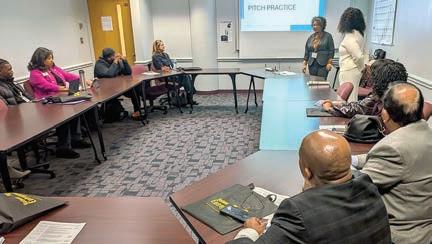
Breakout sessions presented a wide variety of valuable subject matters for entrepreneurs and small business owners, including “Pitch Practice: How to Present Your Business Like a Pro.” Photo Credit: National Entrepreneurs Association.
Dr. Geneva Williams led a panel discussion called “Collaboration Blueprint: Finding the Right Partners to Scale.”
The panel featured successful business owners Tonia Williams, Founder of Universal Special Events Inc., Angela Moore, Founder of The Body Principle, and Business Consultant Dr. Joyce L. Suber.
The morning keynote speaker, Jon Jansen, a former University of Michigan football player and current media personality, set the tone with an informative presentation on “Collaborating with Media in a Multi-Platform World.” Jansen, an 11-year NFL veteran and entrepreneur, offered strategies for maximizing business exposure across both traditional and digital platforms.
The afternoon keynote speaker, Paula Tutman, delivered an insightful presentation on the power of collaboration, highlighting how working together can increase knowledge and accelerate business success. Attendees enjoyed a lunch buffet featuring multiple food stations and a wide range of options to suit every taste, creating the perfect setting for networking and conversation.
The day was a true celebration of entrepreneurship, community, and the spirit of collaboration! Lawrence Technological University, Comerica Bank, and the City of Southfield sponsored the event.
“The biggest outcome from the conference was the quality of connections made,” said Dr, Allen. “We created

Construction underway to deliver 211 new units; Comerica Bank to provide community development lending and investments to support development
DETROIT — At a public ceremony held Friday, Nov. 14, the City of Detroit joined development partners MHT Housing, Inc. and Kirsten’s Touch, Inc. lead by Bishop Charles H. Ellis III, to break ground on four new buildings that will bring 211 units of new affordable and permanent supportive housing to long-vacant land next to the historic Brewster Wheeler Recreation Center.
Of the total units, three affordable housing phases known as Brewster I, II and III will each include 53 units for a total of 159 units. Each received its own award of 9% low-income housing tax credit (LIHTC) from the Michigan State Housing Development Authority (MSHDA).
Each building will be 100% affordable with a mix of 1BR and 2BR units providing housing for a wide-range of incomes ranging from 30%-80% of the area median income, with rents for one-bedroom units currently estimated to start at $473, and at $568 for two –bedroom units, with rents based on household incomes.
The remaining 52 units will be housed in a development known as The Sanctuary at Brewster, a 52-unit permanent supportive housing (PSH) community, which represents the first major phase that will be completed in the overall $83 million multi-block redevelopment.
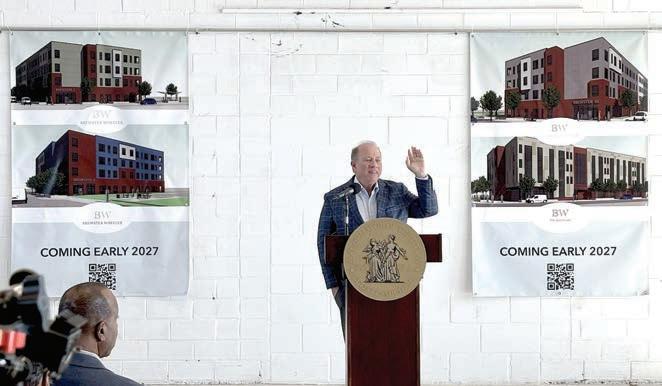
City of Detroit Mayor Mike Duggan addresses that gathered audience and media at the groundbreaking ceremony to celebrate the development of four affordable housing buildings next to the historic Brewster Wheeler Recreation Center. Renderings of the new buildings are displayed in the background.
The Sanctuary will provide 52 deeply affordable one-bedroom units, each supported with project-based vouchers that ensure residents pay no more than 30% of their income toward rent.
All 52 units are part of the City’s targeted efforts to bring deeply affordable supportive housing online to meet the needs of residents experiencing homelessness, with on-site wraparound services to support long-term housing stability. Providing this level of support has been shown to reduce recidivism back into homelessness.
Completion of the Sanctuary, as well as Brewster I, II and III, is scheduled for 2027.
“Today is about rebuilding a neighborhood and about rebuilding lives,” said Mayor Mike Duggan. “The Sanctuary at Brewster will ensure that some of our most vulnerable residents have stable housing, supportive services, and the chance to heal and thrive — right here in the heart of our city.”
“As we continue to build a more equitable Detroit, developments like The Sanctuary at Brewster remind us of our responsibility to uplift every member of our community,” said Mayor-Elect Mary Sheffield. “By providing stable, supportive housing for young people transitioning out of foster care, we are investing in human potential and showing what compassionate leadership can achieve. This is the kind of progress that honors Detroit’s legacy and secures its future.”
Permanent Supportive Housing (PSH) is the combination of deeply affordable housing and supportive services that help people who face the most complex challenges to live with stability, autonomy, and dignity. At its core, PSH focuses on improving the lives of tenants.
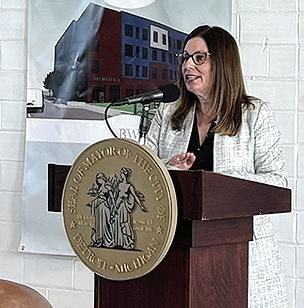
Comerica Bank Senior Vice President and Community Development Investments Group Manager Michelle Lemerond speaks during the groundbreaking ceremony.
“We are busting with excitement in humility at the opportunity to provide affordable housing, services, and resources to those who have been marginalized with the maximum hope that they will take advantage of these beneficial programs to advance themselves not just for a day; but for a Life-Time” said Bishop Charles H. Ellis III, President, Kirsten’s Touch, Inc.
The service provision teams, Neighborhood Legal Services Michigan and Detroit Wayne Integrated Health Network, in partnership with Kirsten’s Touch, will provide over 60 hours of weekly on site, low-barrier service provision. This includes case management and peer support specialists. The model of support will focus on five key pillars: Education, Physical and Mental Health, Workforce Development, Life Skills, and Legal Assistance. These services are offered at no cost to residents and are optional for residents to participate in.
The groundbreaking ceremony featured over 100 dignitaries from the city of Detroit, state of Michigan agencies, construction partners, and invited guests. MHT Housing leading transformational redevelopment
MHT Housing has long been an active developer of affordable housing in Michigan. In Detroit, they have developed several key projects in recent years, including the Rev. Jim Holley Residences, Cathedral Arts, the Brush Park Apartments, MLK on 2nd Apartments and many others. The Brewster development is MHT’s largest new construction project to date in Detroit.
“The development team is extremely proud to be able to complete the redevelopment of the Brewster Wheeler site, through the combination of a substantial amount of new affordable and workforce housing, along with the reactivation of the
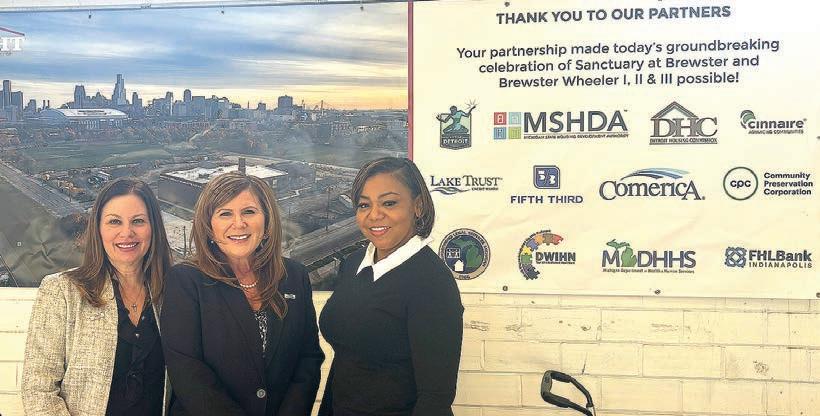
Representing Comerica’s Community Development Banking team at the groundbreaking ceremony of Brewster I, II, III and Sanctuary at Brewster included (l-r): Senior Vice President and Community Development Investments Group Manager Michelle Lemerond, Vice President and Community Development Investments Relationship Manager Kelly Solaka and Vice President and National Community Development Program Manager Lykesha Shelton.

Fox,
addresses over 100 gathered dignitaries, guests and media to break ground on four new affordable housing units held at the Brewster Wheeler Recreation Center.
“Detroit’s affordable housing strategy is rooted in ensuring that everyone — especially our neighbors experiencing homelessness — has a safe place to call home,” said Julie Schneider, Director of Detroit’s Housing and Revitalization Department. “The Sanctuary at Brewster and the redevelopment of the Brewster Wheeler Recreation Center honor the history of this neighborhood while building a more inclusive future.”
The multi-building development also includes project-based vouchers from the Detroit Housing Commission to ensure long-term stability. Development Partners & Financing
The Sanctuary at Brewster is co-developed by MHT Housing, Inc. and Kirsten’s Touch, Inc., with financing supported through MSHDA, the City of Detroit, and Cinnaire. Additionally, MSHDA is providing project-based voucher support for all units to ensure longterm affordability for future residents. DWIHN and NLSM will provide ongoing support services, which will be further supported by MSHDA and MDHHS.
“The Sanctuary at Brewster represents exactly what we mean when we talk about housing as a foundation for opportunity,” said Amy Hovey, CEO and Executive Director of the Michigan State Housing Development Authority (MSHDA). “This development is the result of deep collaboration between the City, faith-based leaders, and housing partners who share a commitment to ensuring every Detroiter has a safe, stable, and supportive place to call home. MSHDA is proud to help make this vision possible through an award of Low-Income Housing Tax Credits, HOME-ARP funding and permanent financing.”
Brewster Wheeler I, II & III is also co-developed by MHT Housing, Inc. and Kirsten’s Touch, Inc., with financing supported through various funding partners, including The City of Detroit, Fifth Third Bank, Comerica Bank, Community Preservation Corporation, Cinnaire, Federal Home Loan Bank of Indianapolis, and Lake Trust Credit Union. Additional support is being provided by the Detroit Housing Commission through the availability of project-based vouchers for 8 units in each of the 3 phases (24 PBV total).
“These homes have been championed by the collective efforts of the City of Detroit—with special thanks to Mayor Duggan and Mayor-Elect Sheffield—the State of Michigan and many other valuable partners here today,” said Michelle Lemerond, Comerica Bank Senior Vice President, Community Development Investments Group Manager, during the public groundbreaking ceremony at held at the historic Brewster Wheeler Recreation Center.
“It exemplifies what we can achieve when we work together for a larger purpose.
Comerica is providing $40 million in community development lending and Low Income Housing Tax Credit (LIHTC) equity.
“We are committed to driving sustainable growth and creating positive change throughout the commu-

nities we serve. We believe in helping people succeed, and a home resides at the core of that success. What makes Brewster Wheeler stand out is what residents will receive beyond the housing unit itself. The wraparound services assisting residents daily will help residents here thrive.”
Lemerond noted that Comerica has invested in nearly 30 HMT Housing developments over the years.
Fifth Third Bank and Cinnaire were also critical financing partners.
“Fifth Third Bank is proud to play a key role in reshaping Detroit’s affordable housing landscape through our strategic investment in the Brewster Wheeler redevelopment in Brush Park. By leveraging a balanced mix of debt and equity financing, we’re doing more than supporting a project—we’re investing in the longterm vitality of Detroit’s neighborhoods,” said David Girodat, Regional President, Fifth Third Bank, Michigan. “Our strong collaboration with MHT Housing, a leader in affordable housing, ensures that Detroiters gain access to high-quality, attainable homes. With more than 20% of residents spending over half their income on housing, these efforts are critical to addressing this challenge and building vibrant, sustainable communities.”
“Transformational projects like this are only possible through strong public–private partnerships. By combining the City’s leadership with mission-driven developers and service providers, we’re creating affordable homes and supportive services that will provide stability and opportunity for Detroiters for years to come,” said Mark McDaniel, CEO of Cinnaire. Restoring a Historic Detroit Landmark
The larger redevelopment also is restoring the historic Brewster Wheeler Recreation Center, where Joe Louis used to train and Diana Ross played as a child. Final uses are still unfolding as the Brewster Wheeler Recreation Center targets completion in 2026.
As part of the restoration, KRONK Gym will return to the Brewster Wheeler Recreation Center and will soon open. An event celebrating the reopening of the recreation center, and Kronk Gym will happen in the near future.
A5 | November 19-25, 2025
By JPMorganChase
Q&A with new Global Philanthropy Lead
Katrina Chaves

JPMorganChase has reached a significant milestone in Detroit, announcing that its business and philanthropic investments in the city have now surpassed $2 billion since 2014. This reflects the firm’s deep and ongoing commitment to Detroit’s growth and revitalization. As part of this new chapter, the firm also unveiled plans for a state-of-the-art downtown office and conference center, designed to foster collaboration, innovation and community engagement—further underscoring its support for Detroit’s continued resurgence.
To build on this momentum, JPMorganChase is proud to introduce its new Global Philanthropy Program Officer in Detroit Katrina Chaves.
What attracted you to this role?
Chaves: This is an incredible opportunity to serve Detroit. Having lived in the city on and off over the last decade, I’ve been fortunate to meet people from all walks of life and experience its many neighborhoods. It’s a privilege to help guide the firm’s investments in the city and to partner with the people and organizations already making a difference. Early in my career, I learned the importance of tri-sector leadership—working across public, nonprofit and private sectors to solve big challenges. Most of my career has been in the public sector, and before taking this role, I worked with Trust Neighborhoods, a national nonprofit that helps communities create their own mixed-income neighborhood trusts. I wanted private sector experience at some point, but it needed to be a role with purpose beyond just making profit. I couldn’t have asked for a better fit with this role – I work for a global company that values investment in communities and sets the standard for how the private sector can help strengthen the places where it does business.
In 2016, I started my career at the City of Detroit’s Housing and Revitalization Department, where I facilitated public-private partnerships, negotiated with developers to secure affordable units and helped them navigate city processes – all with the aim of building more safe, quality and affordable housing in Detroit. Looking back, I realize that my work was closely connected to the investments JPMorganChase was making in neighborhoods and commercial corridors. Now, stepping into this role feels like a full-circle moment. I’m able to continue this work with a deeper understanding of how philanthropy can help drive large-scale impact in collaboration with the community.
I come from very humble beginnings, and my family has faced many of the challenges I’m now working to address. The perspectives I bring—personally and professionally—are valuable, and my hope is that they contribute to more thoughtful, effective and inclusive solutions.
What do you see as Detroit’s greatest strengths and opportunities?
Chaves: Detroit’s greatest strength is its people—the heart, grit and determination of communities who have been through a lot and keep moving forward. The authenticity and creative energy in this city are unmatched. We see it in the arts and music scene, the city’s architecture and design, in Detroit’s legacy of innovation and the rapid growth in technology and mobility sectors. I think overcoming struggle and adversity can fuel a spirit of innovation and creativity. I’m constantly inspired and energized by the residents of this city. Looking ahead, Detroit has significant opportunity to build on the recent upward momentum and growth. We need to do so in a way that benefits even more residents and neighborhoods across the city.

By Ebony JJ Curry SENIOR REPORTER
The federal government’s funding stalemate has ended. On Wednesday night, Nov. 12, President Donald Trump signed legislation that re-opens the government after a 43-day lapse, the longest such shutdown in U.S. history.
The House of Representatives approved the measure by a 222-to-209 vote. Among House Democrats, six crossed party lines to join Republicans; among Republicans, two voted “no.” Those six Democrats were Reps. Henry Cuellar (Texas), Don Davis (North Carolina), Adam Gray (California), Jared Golden (Maine), Marie Gluesenkamp Perez (Washington), and Tom Suozzi (New York). The two Republicans who opposed the measure were Reps. Thomas Massie (Kentucky) and Greg Steube (Florida).
At the bill-signing in the Oval Office, Trump declared that “this was an easy extension, but they didn’t want to do it the easy way. They wanted to do it the hard way.”
The agreement temporarily extends last year’s spending levels through the end of January for much of the government, and funds certain agencies through next September, including the Supplemental Nutrition Assistance Program (SNAP).
For Black communities across the country, many of whom depend disproportionately on federal safety-net programs, this shutdown and the way it ended raise urgent questions about both immediate harm and long-term implications. The immediate harm
For millions of Americans, the shutdown meant job insecurity, delayed or canceled benefits, and a sidelined healthcare fight. An estimated 900,000 federal employees were furloughed and around 700,000 were required to work without
pay. For low-income households, the pause in SNAP funding threatened more than 40 million Americans — about 1 in 8 people — who rely on the program for food security.
While some states sued the federal government to preserve food aid, Michigan was amongst them and moved quickly to implement emergency measures that kept vital benefits in place.
Across Michigan, where roughly 1.4 million residents depend on SNAP — about 13 percent of households — the Michigan Department of Health and Human Services (MDHHS) worked around the clock to protect families from losing food access. After the U.S. Supreme Court temporarily paused federal SNAP payments nationwide, MDHHS announced that it would immediately resume full payments to Michigan recipients beginning November 10.
The state prioritized households that typically receive their benefits early in the month and coordinated with food banks and nonprofits to handle rising demand. Officials also issued public alerts to ensure residents knew their benefits would continue and that no one needed to reapply or recertify to receive aid. That action reflected how critical federal programs are for everyday Michiganders — especially Black households, who are more likely to experience food insecurity and depend on these benefits to make ends meet.
The state’s response was one of several measures to blunt the shutdown’s blow.
At Detroit Metropolitan Airport, federal cutbacks affected air-traffic staffing and flight scheduling. Senator Erika Geiss, who serves on the Senate committee overseeing transportation and labor, pushed for a review of the economic damage caused by the 10 percent reduction in air traffic at 40 major


By Sam Robinson SENIOR REPORTER

remain office space.
Rock vice president Jared Fleisher pitches a vision of a new Renaissance Center that would anchor a thriving riverfront, similar to Chicago’s Navy Pier. Fleisher and General Motors vice president of infrastructure David Masseron echoed similar sentiments that the funding will allow the public to take back the riverfront.
Masserson said at the meeting Wednesday the previous urban planning reduced public accessibility.
The Detroit Downtown Development Authority on Wednesday, approved the public funds to reimburse Bedrock for the cost of razing the Ren Cen’s “podium,” the large square which connects the four 39-story office towers to the base of the building. Another $55 million will reimburse Bedrock for the cost of redevelopment of the entire complex.
“By eliminating much of the inward-facing, dated and impossible to navigate concrete podium super-block, The Ren Cen can be ‘opened up’ to Jefferson, downtown and the waterfront,” designers wrote in conceptual renderings which show the complex easily accessible from Jefferson Avenue.

The $75 million deal approved by the DDA this week requires an extension of the Transformational Brownfield Program which developers have used for large projects, such as the Hudson’s building in Detroit, or a pro soccer stadium in Grand Rapids.
The state Legislature must approve an increase of the cap on the fund, which needs more funds to be used for the Ren Cen proposal.
It’s unclear when lawmakers
U.S. airports, including Detroit Metro. Geiss and her colleagues pressed for transparency around the federal slowdown’s local impact on workers, travelers, and the state’s economy.
At the same time, Senator Sarah Anthony advanced a package of bills addressing a related crisis that intersects with the same economic pressures exposed by the shutdown: medical debt.
Her legislation builds on Michigan’s broader efforts to protect consumers from predatory collection practices and to strengthen hospital accountability.
“Medical debt isn’t just a number — it’s families worrying about their future, skipping care, and feeling trapped by bills they never expected,” Anthony said.
The timing of that legislation amid a national shutdown that left millions without stable paychecks or coverage, underscored how economic instability ripples through every part of life for working families, particularly Black families who are already disproportionately burdened by medical costs.
For Black households, these impacts carry added weight. Black Americans are overrepresented in low-income brackets, more likely to depend on SNAP and other supports, and also more vulnerable to economic shocks. When a federal shutdown disrupts paychecks and benefits, the ripple effect often lands hardest in communities already facing structural inequality.
SNAP benefits are poised to restart quickly now that funding is restored, with USDA officials estimating many states can resume payments “within 24 hours.” But weeks of uncertainty created hardship: the stoppage and delay meant food-banks reported surges in demand and households had to reduce groceries, delay medical care, and skip bills. What this means now
The new funding law reverses certain damages: it ensures backpay for federal employees, reverses the mass-layoffs ordered by the Trump administration during the shutdown, and restores funding for essential services. Yet the central policy conflict that triggered the shutdown remains unresolved: the law does not extend
How is JPMorganChase working to address these needs?
Chaves: JPMorganChase is focused on strengthening the systems that support Detroit’s communities. We’ve worked with organizations to help make quality affordable housing more accessible through LISC’s Detroit Housing for the Future Fund, the Detroit Development Fund and we continue to support emerging developers behind these projects with funding for technical assistance and predevelopment capital through these organizations. We’re helping to activate neighborhood commercial corridors through the Strategic Neighborhood Fund that is managed by Invest Detroit in partnership with the City, and we keep investing in Detroit’s small business ecosystem. As part of our workforce strategy, we work with local organizations to help more Detroiters access good jobs and build successful careers. We’ve created new jobs through the Chase virtual call center, continue to support youth summer job opportunities through Grow Detroit’s Young Talent and work with organizations that help remove barriers to quality employment and offer handson training and mentorship for underserved individuals – whether they’re first-generation college students, childcare providers, aspiring fashion designers or skilled tradespeople.
Why is it important for JPMorganChase to give back to the community?
the enhanced subsidies under the Affordable Care Act (ACA) marketplace, which Democrats sought. Premiums are expected to rise significantly when the subsidies expire at year’s end.
This means the harm, especially to Black communities, is not behind us.
The shutdown exposed how deeply federal funding flows into the day-to-day stability of many households. Without the ACA subsidies fixed, the next shock may be premium increases and loss of coverage, which disproportionately affects Black adults and children.
Politically, the shutdown underscores a crucial lesson: using government closure as leverage often yields no meaningful policy gain. Experts note that shutdowns historically do not force a party to win the terms they sought. For Black communities being asked to bear the cost of stalemate, that lesson hits hard. Why Black communities should pay attention
When government compensation stops and benefits lag, families face choices: pay rent or buy groceries; fill prescriptions or buy food. During this shutdown, federal workers reported skipping meals, cutting staples, and relying on credit. For Black Americans who on average have fewer financial reserves and who have faced generations of under-compensation and structural barriers, the impact is magnified.
The reopening bill does provide two near-term wins: SNAP and federal pay are restored. But health-care stability remains out of reach unless Congress acts. The road ahead
Both parties face consequential choices. Senate Democrats have roughly a month to draft a bill extending the ACA subsidies in a way that persuades enough Republicans to pass it. If successful, Democrats could enter 2026 with a major policy victory. If not, health care remains a potent electoral issue especially among Black voters who often rate it among top priorities. Some Republicans say they will consider reforms to the subsidies, including fraud prevention and income caps.
Meanwhile the federal government is funded only until January for many agencies, nine appropri-
could vote on such a proposal. State Rep. Alabas Farhat, D-Dearborn, introduced legislation to add more money to the fund earlier this year.
Fleisher during the DDA meeting Wednesday told board members the $75 million in public funds would be awarded only as reimbursement for demolition and construction work as it happened, the Detroit Free Press reported.
ations bills remain incomplete. The chance of another short-term funding lapse looms. And Black communities shouldn’t assume the worst is over.
The shutdown was an intense stress-test of public systems. The next one could begin with fewer protections.
Bottom line for Black communities
The government shutdown ended — but the underlying inequities it exposed did not. Households felt the shutdown’s impact deeply: halted paychecks, food-insecurity risks, delayed services. The renewed funding brings relief but also a reminder: federal safety
Board members voted unanimously in favor of the commitment, with one member abstaining.
General Motors in January will relocate its global headquarters out of the RenCen after decades in the building. The company will move to Bedrock’s new Hudson’s Detroit building.
You can reach Sam at srobinson@michronicle.com.
nets remain fragile and politically contingent.
The negotiation over ACA subsidies and the unresolved appropriations mean the pressure is not gone.
For Black America, the message is clear: stay vigilant. Track policy developments, monitor local effects of federal delays, and engage. The survival of households often depends on whether Washington treats these programs as essential or optional. This week the lights turned back on. But the wiring is still uncertain.
Ebony can be reached at ecurry@michronicle.com.
Chaves: Access to economic opportunities and resources can truly change a person’s life. I’ve experienced firsthand how quality education, stable and safe housing and a supportive community can give a solid foundation – regardless of one’s background. It won’t come as a surprise to many that when a person has access to meaningful work, opportunities to build their skills and connections to mentors and a supportive network, they’re better equipped to pursue rewarding careers and work toward longterm economic stability.
That’s why we focus our investments on removing systemic barriers and expanding pathways to success—whether that means starting or growing a business, having quality and affordable housing, developing skills to advance careers and increase earnings or building wealth to pass on to the next generation. While it’s exciting to see the city’s progress and momentum, we know there’s still more work to do. We’re committed to continuing to listen, learn and support Detroiters as they shape the city’s next chapter.
Where can Detroiters go to learn more about JPMorganChase’s work?
Chaves: You can learn more about JPMorganChase’s investment in Detroit and our lessons learned along the way at jpmorganchase. com/communities/Detroit.



By Jehan Crump-Gibson GUEST COLUMNIST
One of the biggest mistakes people make is naming minor children as beneficiaries on accounts and policies. The thought is “I’ll avoid probate court because I have beneficiaries named and they’ll get the money directly.” This is only partly true. That money will avoid probate court on the FRONT end, not the BACK end. Why is that?
Minor children are legally unable to contract or to manage money. Because of this, financial institutions often require probate courts to appoint a conservator to control the funds left behind for a child until the child reaches the age of majority. This can cause delays, increased fees and court control over how the money is used. This applies no matter who the child’s surviving relatives are, even if it is their own parent.

Let’s take Jill, for example, who is a 34-year-old single mother with an 8-year-old daughter and 6-year-old son.
She works as a nurse with one of the big health systems. She has a whole life insurance policy through work with a $100,000 death benefit and a separate term policy that has a $1,500,000 death benefit. She also has a 401(k) plan. She has named her two children as beneficiaries on all these accounts because, after all, she is leaving everything for them.
Jill works 12-hour shifts, rips and runs with the children’s activities, and helps care for her ailing paternal grandmother, who lives with her. She has not been feeling the best lately, but she pushes through and vows to make an appointment with her primary care doctor soon.
One day, Jill unexpectedly experiences a ruptured aneurysm and passes away.
Obviously, her family is shocked and devastated by the loss. Her mother Renita takes in the children and begins to go through Jill’s paperwork. She is relieved when she sees that the children are named as beneficiaries— that is until she calls the financial institutions and is informed that they require the court appointment of a conservator to release the funds. She cannot understand why a court must get involved when she is the children’s grandmother and they are in her care!
Renita must go through probate court proceedings. Assuming she is appointed by the court as conservator, the funds will likely have to be placed in a restricted account, and she will have to get court approval to make expenditures for the benefit of the children— until they reach age 18. Annual reports and supporting documentation are required.
This is the type of nightmare that proper planning can avoid. The best option if there is a minor beneficiary – whether this is a child, grandchild, niece, nephew, cousin or godchild – is to set up a Trust.
The Trust will dictate who manages the money for the children and how it is to be spent— all without court involvement.
Alternatively, there are Michigan Uniform Transfer to Minors Act (UTMA) accounts that may be appropriate for smaller accounts and policies. The Michigan Uniform Transfer to Minors Act allows a person to transfer property, such as bank accounts, securities, life insurance policies, etc. to a minor to be held for the benefit of that minor until that individual reaches the age of 18 and in some cases, up to the age of 21.
These accounts or may or not be appropriate depending on the type of asset and the value. The important takeaway is that you have options to avoid probate court entirely. Contact an experienced estate planning attorney today!
Attorney Jehan Crump-Gibson is the Co-Founder and Managing Partner at Great Lakes Legal Group PLLC, where she concentrates her practice in probate and estate planning, business and real estate matters. Great Lakes Legal Group is a growing black-owned law firm serving clients throughout the state of Michigan and in federal courts across the country. Jehan has served as Faculty for the National Business Institute and the Institute of Continuing Legal Education concerning business, probate and estate planning matters. She is a legal analyst with Fox2 Detroit’s The Noon and the author of the book A Matter of Life and Death.

FORCE Detroit invites the community to a powerful evening of inspiration and impact at its 10th Anniversary Gala on Wednesday, Dec.10, at 6 p.m. The celebration will take place at the Charles H. Wright Museum of African American History, 315 E Warren Avenue, Detroit, honoring visionary founder Alia Harvey-Quinn and the grassroots leadership that has helped reshape public safety in Detroit.
The evening will feature keynote remarks by Rev. Alvin Herring, former executive director of Faith in Action and former Director of Racial Equity at the W.K. Kellogg Foundation. Serving as emcee is award-winning local personality Tati Amare, host of WDIV-TV morning host Live in the D.
The gala will feature a VIP networking reception, dinner, dancing, and a reflection on a decade of impact. Guests will meet youth, families, and frontline workers and hear powerful and heartfelt stories about lives transformed through FORCE’s work in community violence intervention. The evening will also highlight the organization’s role in Detroit’s ShotStoppers initiative, which has helped reduce violent crime in CVI zones by historic rates.
“Alia’s work has changed lives and saved lives,” said Racheal Allen, FORCE Detroit Board President. “This event is not just a celebration, it is a chance to build a safer Detroit by investing in young leaders and proven community solutions. We invite the city to show up for this movement.”

FORCE Detroit is calling on business, civic, and community leaders to join this milestone event. All proceeds support the newly launched Alia Harvey-Quinn Fellowship Program, which invests in young people embarking on their leadership journey in violence prevention and community organizing.
“With a team of incredible Detroit peacemakers beside me, we built FORCE Detroit, and grew it into an organization recognized by The White House, State of Michigan, and the City, for building Detroit communities that are safer, and freer,” Harvey Quinn said in a statement. “I am proud of this work that transforms lives and proud of the Fellowship that will continue to uplift Detroit youth.”
Founded by Harvey-Quinn, a daughter of Black Panthers and lifelong activist, FORCE Detroit was built on a legacy of resistance, care, and liberation. Her leadership has helped bring millions of dollars in resources to neighborhood leaders and grassroots organizations across Detroit.
Harvey-Quinn is one of the few women leading a CVI organization nationally and was appointed by Gov. Gretchen Whitmer to the Michigan Gun Violence Prevention Task Force.

FORCE Detroit has received national and local attention as one of the city’s leading community violence intervention organizations. Recent FORCE efforts has led to a more than 50 percent drop in violent crime in its zone, and the city is experiencing the lowest crime rates since the 1960s. The work includes immediate response to violence, mentorship, relocation services, youth leadership programs, career development, and access to mental and physical healthcare.
“Our work is literally saving and transforming lives and building up communities in Detroit. I know from personal experience that CVI saves lives, because it saved mine,” said Dujuan “Zoe” Kennedy, Executive Director of FORCE Detroit. “Still, we have a lot more work to do. Violence is still impacting our community. This gala honors those who are doing the work but it is also call to action to keep investing in community solutions that work. Our work is far from over.”
Event Details
Date: Wednesday, December 10, 2025
VIP Reception: 6 PM to PM
Main Celebration: 7 PM to 10 PM
Location: Charles H. Wright Museum of African American History
Address: 315 E Warren Avenue, Detroit, MI 48201
Ticket Information
General Admission: $150
VIP Admission: $175
For general questions about the gala, contact Toye at 313.900.7029 or email latoye@forcedetroit.org. For sponsorship inquiries, contact Jasmin at 313.716.4953 or jasmin@ forcedetroit.org.
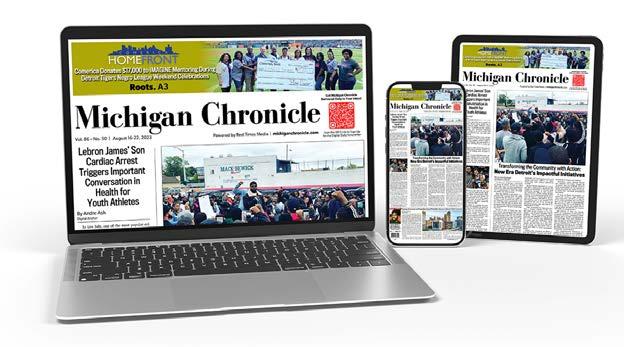

The Better Business Bureau of Michigan proudly honored the state’s most ethical businesses during the 2025 Torch Awards for Ethics Luncheon, held November 10 at Schoolcraft College’s VisTaTech Center in Livonia.
The awards ceremony drew business leaders from across Michigan to celebrate companies that exemplify integrity, trust, and excellence in their communities. Attendees enjoyed a keynote address from Mark S. Lee, founder of The Lee Group and respected marketing strategist, and an engaging program emceed by Rob Wolchek, award-winning FOX 2 Detroit investigative reporter.
Finalists represented businesses from every corner of the state—from Escanaba in the Upper Peninsula to Traverse City and communities throughout lower Michigan—highlighting the strength and diversity of Michigan’s business community. After careful review by an independent panel of judges, the following companies were named winners of the 2025 Torch Awards for Ethics:
“I look at BBB as the seal of approval. When you have been aligned with an organization like that for 100 years it means that it is part of your culture and part of your DNA. It tells our customers we are going to put them first. In fact, one of our core values at Comerica is the customer always comes first, so it tells you it is just now how we say things but how we do things, which for many of our customers is way more important. You know when a business is BBB accredited, they are going to do things the right way, they have a commitment to their customers, they have a commitment to integrity to doing things the right way. It’s not one person, it’s the whole organization that believe in that for us to get this far.”
Steve Davis, Comerica Bank Michigan Market President
ton-McKay Electric Company, marking 75 years of accreditation, and Comerica Bank, celebrating an extraordinary 100 years—one of only 16 businesses nationwide to reach this milestone.
Accepting on behalf of Comerica Bank was Alicia Stephens, Senior Vice President and Director of Corporate Quality.


right way. It’s not one person, it’s the whole organization that believe in that for us to get this far.”
Comerica’s service to its customers for 176 years has been based on critical factors that focus on establishing trust, ethical behaviors and integrity, all qualities valued by BBB and its critical.
“In our industry, trust and

celebrations from just one event in Dallas in 2021 to four events in Texas (Dallas, Houston, San Antonio and Austin) in 2024. In 2022, Comerica expanded the program to hosting a celebration in Detroit, while growing to include events in Northern and Southern California. A year later, Comerica started celebrations in Phoenix, Arizona and Broward County, Florida.
quality of connections made,” said Dr, Allen. “We created a space where entrepreneurs were not just exchanging business cards, they were identifying real opportunities to partner, share resources, and create solutions. Attendees found collaborators they would not have met otherwise.”
These sessions gave participants practical tools and resources they can apply immediately to strengthen and scale their ventures.
“The feedback we received has been overwhelmingly positive. Many told us they have already begun collaborating and partnering with people they met at the conference. We even formed a partnership with The City of Southfield as a result of this event,” said Dr. Allen.
Comerica Bank sponsored the 2025 Entrepreneur and Small Business Conference as part of the bank’s ongoing support of the NEA.
“Congratulations Dr. ZaLonya Allen and the National Entrepreneurs Association on the best Small Business and Entrepreneurship Conference thus far,” said Kevin Watkins, Comerica Bank Vice President and External Affairs Market Manager. “It


By Jeremy Allen
EXECUTIVE EDITOR
As the cost of higher education continues to climb and scholarship opportunities become increasingly competitive, one Metro Detroit event is giving families the tools to stay ahead. The 12th Annual Black Friday Scholarship Bootcamp returns to Southfield this Thanksgiving weekend, aiming to help students and parents navigate the “race for scholarships” with strategy and confidence.
Hosted by Fresh Perspectives Seminars, the bootcamp will take place Friday, Nov. 28, 2025, from 9 a.m.-2 p.m. at the Radisson Hotel Southfield–Detroit, with a follow-up virtual session on Saturday, Nov. 29, from 10-11:30 a.m.
Founded by nationally recognized college and scholarship expert Gwen Thomas, the event has become a staple for Metro Detroit families determined to make college affordable. Thomas, often called “The Scholarship Guru,” has helped more than 10,000 students earn over $30 million in scholarships. Her keynote this year, “Paying for College in a Project 2025 Climate,” will address the growing challenges families face amid shrinking financial aid and shifting admissions policies.
“I’ve watched far too many families destroy their opportunity to build wealth simply because they don’t understand how the college financing system works and they leverage their line of credit to pay for college for students,” Thomas said. “For many families, they have little savings and fall victim to predatory lending. For me, this mission is more than helping students get scholarships. We have to break the cycle of financial bondage, empower families to build generational wealth, and make sure our students are adequately prepared to thrive in a competitive workplace.”
In addition to Thomas’ keynote, the bootcamp will feature:
• Education experts breaking down the latest changes in college admissions and funding.
• Career professionals introducing students to emerging, high-demand industries.
• SAT/ACT specialists sharing proven testprep strategies.
• Financial literacy educators offering insights into navigating FAFSA, loans, and debt-free options.
The Black Friday Scholarship Bootcamp has built a reputation for closing the wealth and information gap among Metro Detroit students and families. Its interactive sessions are designed to help attendees build strong college portfolios, write winning scholarship essays, and connect with mentors and scholarship reviewers who can open doors to opportunity.
Event Details:
• What: 12th Annual Black Friday Scholarship Bootcamp
• When: Friday, Nov. 28, 2025 – 9 a.m.-2 p.m. (lunch provided)
• Where: Radisson Hotel Southfield–Detroit, 26555 Telegraph Rd. in Southfield
• Virtual Session: Saturday, Nov. 29, 2025
– 10-11:30 a.m.
• Who: Students, parents, educators, and community partners committed to debtfree college success

By Jeremy Allen EXECUTIVE EDITOR
In the heart of Midtown Detroit, a well-known local business is making waves as it reopens its doors with a fresh look and expanded offerings.
Le Petit Dejeuner, a beloved breakfast spot that has served Detroit residents for nearly a decade, is stepping into an exciting new phase. After a year-long hiatus, the restaurant has relocated from its original spot on Jefferson Avenue to a more prominent location 4216 Woodward Ave., right next to the bustling Wayne State University campus and the Detroit Medical Center. The move comes with a redefined concept, new hours, and even a touch of evening entertainment, now adding a weekend menu complete with the best soulful offerings they’re calling the Soul Food Lounge.
Opened in 2015, Le Petit Dejeuner quickly established itself as a go-to spot for breakfast lovers, serving up hearty dishes with a unique twist. The restaurant became known for its family-style breakfast menu, where groups could order a variety of dishes that arrived at the table on platters to share. But as is often the case with Detroit’s ev er-evolving landscape, change was necessary to keep up with grow ing competition and changing consumer expectations.
“We’ve been open for 10 years,” said Tina Marie Motley, the owner of Le Petit Dejeuner, who prefers to remain behind the scenes while letting the food speak for itself. “We started in 2015, and now we’re here in Midtown. The new location has a lot of foot traffic because
of the proximity to Wayne State and the medical center. The move has really opened up opportunities for us to expand what we offer.”
The new location, with its increased visibility and higher foot traffic, prompted the restaurant to extend its hours and broaden its menu. In addition to its famous breakfast offerings, Le Petit Dejeuner has introduced a soul food lounge concept on Friday, Saturday, and Sunday afternoons, running from 3-7 p.m.
The cafe serves up a menu full of soul food favorites—taking the kitchen beyond breakfast and adding an evening vibe to the space. “We’ve gone beyond breakfast,” the owner explained.
“We’re calling it Soul Food Cafe in the evenings. It’s been a great way to engage with people who are looking for a cozy spot to eat after the sun sets.”
But the restaurant’s transformation isn’t just about food. The new location also offers a stage for local entertainment, with regular comedy shows aptly named “Laughs at LPD.” “It’s all about creating an experience,” Motley said. “We’re doing events like this to bring more people through the door and create a sense of community.”

The move was not without its challenges. The restaurant’s previous location had become increasingly difficult to manage. The building, which LPD occupied for years, was deteriorating. Coupled with landlord issues that made it clear an upgrade was needed, the decision to find a new home was inevitable. “The building we were in
By Ebony JJ Curry SENIOR REPORTER
Steel beams bearing the signatures of Motown legends are now locked into place above Hitsville U.S.A., marking the final construction phase of a $75 million expansion that will reshape Detroit’s most famous music museum and the historic neighborhood around it.
Motown Museum held a beam-signing ceremony at Hitsville on Thursday, Nov. 13, celebrating a major construction milestone for what is now officially named The Motown Experience. Chairwoman Robin Terry led the program, joined by Motown alumni, donors, community leaders and key project partners. The ceremony included remarks, a blessing of the space from Rev. Wendell Anthony, and the signing of the final structural beam, which is a symbolic act meant to anchor the next chapter of Motown’s story in steel.
Some of the names on that beam helped build the Sound of Young America the first time around. Signatures included the son of Levi Stubbs, the late lead singer of the Four Tops, and Martha Reeves of Martha and the Vandellas, alongside Terry herself, granddaughter of Motown Museum found-
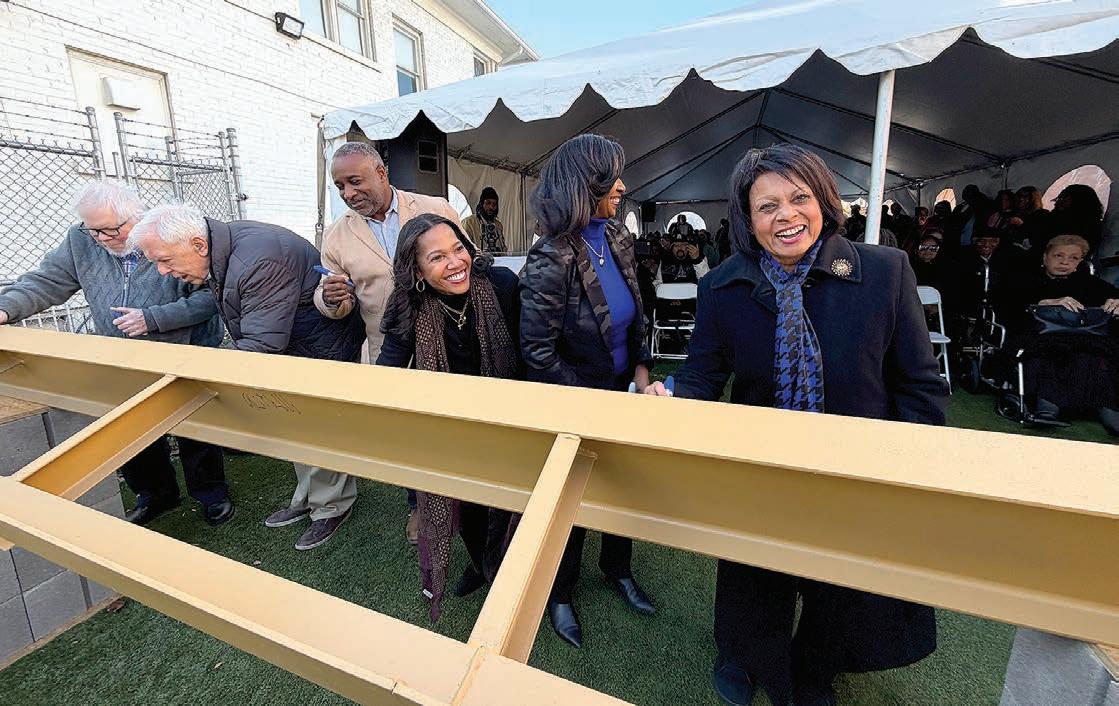

From page B-1
er Esther Gordy Edwards and niece of Motown Records founder Berry Gordy. Their names along with other powerhouses will sit at the top of the new 50,000-square-foot campus that will tell those stories for decades to come.
The expansion, first announced in late 2016, will grow Motown Museum into a nearly 50,000-square-foot entertainment and education destination. The project will feature immersive and interactive exhibits, a performance theater, a recording studio, expanded retail and flexible meeting spaces designed by nationally recognized architects and exhibit designers. Behind the original Hitsville house, a nearly 40,000-square-foot new structure will include a lobby and café, the Ford Motor Company Theater and an expanded retail experience, all designed to move visitors from the narrow original studio space into a larger narrative about Black creativity, entrepreneurship and global cultural influence. Fundraising for the expansion has now reached $72 million, bringing the museum to the brink of its $75 million goal. The final phase of construction is underway and scheduled to be completed in late 2026, with a grand opening planned for spring 2027.
Terry, who has led every phase of the expansion from concept to capital campaign, framed the project as both preservation and course correction. Demand has already outgrown the historic house museum model.
“It’s one of the most visited attractions in the state of Michigan, and oftentimes there are fans that can’t get in because we’re sold out,” said Terry. “We’ve really committed this space to telling those stories. Stories of unsung heroes and sung heroes.”
Those stories sit at the center of a changing leadership structure as well.
Alongside the construction milestone, Motown Museum announced the appointment of Dr. Kenya LeNoir Messer as its new Chief Executive Officer, following a 15-month national search. Dr. Messer will oversee day-to-day operations while Terry remains Chairwoman of the Board of Trustees and continues to drive the expansion through its final fundraising and construction stages.
“Dr. Messer brings the kind of leadership, cultural expertise and insight, and proven experience that make her the right leader at the right moment for our institution,” said Robin Terry, Chairwoman of Motown Museum. “As Chairwoman, I remain deeply committed to advancing my
grandmother’s legacy and continuing to work closely with Kenya and our Board of Trustees.”
Dr. Messer arrives with senior leadership experience at Columbia University and Wilberforce University and most recently served as President and CEO of the Louisiana Association of Independent Colleges and Universities. She is also a published author and longtime cultural board trustee whose work has focused on organizational growth, equity and impact.
“It is a profound honor to join the Museum at such a pivotal moment full of momentum,” said Dr. Messer. “This institution holds an important place in American history—rooted in legacy, creativity, and transformative cultural impact. I am deeply humbled to work with Robin and the incredible team, as we shape the Museum’s next chapter and deepen its reach in the community and beyond.”
Together, Terry, Dr. Messer and Chief Operating Officer Sharri Watkins, along with the museum’s Board of Trustees, will guide the institution through the final stretch of construction and into a new operating reality. That reality reaches far deeper than tourism and ticket sales; it highlights how a Black-founded, Blackled cultural institution uses its footprint to drive jobs, stability and pride in the surrounding Detroit neighborhoods.

From page B-1
Early registration and group discounts for schools, churches, and community organizations are now open at www.freshperspectivesseminars.org or BlackFridaySB. com.
“What sets the Black Friday Scholarship Bootcamp apart is that we go far beyond what students might hear from a typical financial aid advisor or find through an online search. One thing’s for sure—too many families aren’t having the real, relevant conversations about their future,” Thomas added.
“At our bootcamp, students and parents
meet with professionals who tell the truth about what to expect in college, in the workplace, and in life. We help them understand that college isn’t just about getting in—it’s about discovering purpose, building skills, and positioning yourself for opportunity.”
Fresh Perspectives Seminars, a Michigan-based nonprofit founded by Gwen Thomas, has guided thousands of families through the maze of college readiness, scholarship acquisition, and financial literacy, by “empowering students to dream big without the burden of debt,” she said.
For more information, contact info@ FreshPerspectivesSeminars.org.

From page B-1
was kind of falling apart, and the landlord wasn’t interested in putting any money into it,” Motley recalled. “We knew it was time to move on.”
Finding the right spot took a full year of searching, but the location on Woodward Avenue turned out to be a perfect fit.
“We’re right behind the medical center, right in the heart of Wayne State University. It’s been great for business,” she said.
The decision to relocate also coincided with a broader trend in Detroit’s restaurant scene, as many eateries are reinventing themselves to cater to the growing and increasingly competitive market. New developments in the Midtown area, combined with an influx of people moving back into Detroit, have spurred a wave of new business openings, particularly in the food and hospitality sector.
Despite the competition, LPD has managed to maintain a loyal following. “When we closed for a year, it was tough to get back in the game,” the owner admitted. “But we’re back now, and people are coming through. We’re so grateful for the support, especially as a Black female business owner here in the city. It means a lot.”
When completed, the campus is expected to have a “transformative impact” on the historic area by providing employment opportunities, long-term sustainability and community pride while serving as a catalyst for new investment and tourism. That language reflects a larger conversation in Detroit about who benefits when legacy Black cultural spaces become global destinations and how those spaces can anchor, rather than displace, longtime residents.
Motown Museum will remain open to visitors through Jan. 19, 2026.
Tours will pause beginning Jan. 20, 2026, to allow for necessary upgrades and construction work to prepare the campus for the expansion’s completion. During that time, the museum’s leadership will be managing a complex transition: maintaining the authenticity of the original studio spaces, integrating new technology and exhibition design, and positioning the institution to operate at a larger scale once the full Motown Experience opens in 2027.
Ebony can be reached at ecurry@michronicle.com.
In an era where many restaurants have had to pivot to survive, LPD has continued to adapt by offering a unique experience. The family-style breakfast menu remains the restaurant’s signature offering, but the move into evening soul food, live events, and a revamped location show that LPD is committed to growing with Detroit.
“We’ve always been a little different,” Motley said proudly. “No one else in the city does breakfast family-style like we do. And now, with the Soul Food Cafe and our new location, we’re offering something new and exciting to the community.”
The restaurant also faces the same economic challenges that have affected many small businesses, particularly in the food industry. Rising costs and increasing competition means that innovation is key to staying relevant.
“It’s been tough. Breakfast doesn’t bring in a lot of money, and the inventory costs are high. But we’ve been creative, allowing chefs to do takeovers and try new things to help keep the business going,” the owner explained. Despite these hurdles, LPD remains committed to quality and community, striving to keep the spirit of Detroit alive through food, events, and, now, a dynamic new evening offering.
Looking ahead, Motley is optimistic about the future of both the restaurant and Detroit’s broader restaurant scene. “There’s a lot of new energy in the city,” she said. “Detroit is changing, and it’s exciting to be a part of that. I’m just happy to be back and to keep pushing forward.”
As LPD Soul Food Cafe settles into its new location, it’s clear that the restaurant isn’t just about serving food—it’s about creating a space where people can gather, laugh, and enjoy soulful meals together. The grand reopening, Motley said, is a testament to the restaurant’s resilience and commitment to serving the people of Detroit, no matter what challenges come its way.







By Jeremy Allen EXECUTIVE EDITOR
In a significant turn for Detroit’s entrepreneurial ecosystem, the BUILD Institute announced that the organization’s Board of Directors has decided to pause operations at the end of 2025.
In a letter to its community, the board explained that it “recognize[s] that we are living in a time of great uncertainty for small business support organizations across Michigan.” The Board added that the pause offers “an opportunity to reassess how BUILD delivers on its mission, retool our programming, and evaluate new partnership opportunities and our overall business model to ensure long-term sustainability and impact.”
Since its founding in 2012 as part of the Downtown Detroit Partnership, BUILD Institute has become a cornerstone of inclusive entrepreneurship in Detroit. From its initial cohort of entrepreneurs, the organization has expanded to offer an eight-week core curriculum (BUILD Basics), followed by advanced growth-oriented tracks. Its mission focuses on under-represented and under-resourced community businesses, offering training, peer networks, mentorship, and access to capital.
ness model to ensure long-term sustainability and impact.” By continuing scheduled programming through December, BUILD aims to uphold its commitment to current cohorts of entrepreneurs while it designs its next chapter.
This pause comes at a juncture when Detroit’s entrepreneurial landscape is evolving rapidly. While demand among neighborhood-based entrepreneurs remains strong, support organizations face rising costs, shifting funding landscapes and the need to demonstrate scalable impact in a more complex environment.
BUILD’s decision to pause rather than simply wind down gives it space to revisit key questions: how funding flows to micro-business providers; how programs can move beyond “launch” toward longterm sustainability; whether partner-led models can amplify reach; and how alumni networks can play a more active role in the ecosystem they helped build.

For entrepreneurs who have gone through BUILD’s programming, the news may come as a shock, but the board emphasized that the organization’s “network of over 3,000 alums” remains a focus.
By Jeremy Allen EXECUTIVE EDITOR
Eastern Michigan University is expanding its Loan Repayment Assistance Program (LRAP), known as EMU Advantage, to include 16 additional academic programs beyond its original focus on education majors. The expansion builds on the success of the EMU Educators Promise, which was launched to support future teachers and address Michigan’s ongoing teacher shortage.
The EMU Advantage program provides a financial safety net for graduates whose annual income is less than $50,000. For those who qualify, the university helps repay their federal, parent PLUS, and private alternative student loans at no cost to students or their families.
“EMU Advantage reflects our deep commitment to student success and workforce development,” said Katie Condon-Martin, vice president of enrollment management at Eastern Michigan University. “We saw incredible engagement with the Educators Promise, and expanding this support to more majors was the natural next step.”
In fall 2025, 121 students enrolled at EMU with LRAP support, according to university officials. About 88% of those students were first-year or transfer students pursuing education degrees. That represents a sharp increase from fall 2024, when 39 students participated in the program during a late recruitment cycle.
The program’s growth comes amid a persistent teacher shortage in Michigan. A 2024 report by the Education Policy Innovation Collaborative found that 498 school districts reported teaching vacancies during the 2022–2023 school year, with some districts facing vacancy rates of more than 10% of total teaching positions. Governor Gretchen Whitmer’s Top 10 Strategic Education Plan has identified addressing the teacher shortage as one of its main priorities.
coming a teacher,” one student said. “It’s not just financial support—it’s peace of mind.”
Another student said, “The reassurance that LRAP provides has definitely influenced how comfortable I feel getting a degree in teaching. I am very happy that I am able to do what I want with my life and feel safer financially.”
“As someone paying for college on my own, it’s a relief to know there’s additional assistance and financial light at the end of this journey,” another student said. “Furthering my education to teach young students is a passion I’ve chosen to pursue, though it’s costly. The LRAP program gives me confidence and security in my decision to become a teacher and study at EMU.”
Students outside of education fields have also described the program as a significant source of relief. “The Loan Repayment Assistance Program (LRAP) has been an incredible relief,” one participant said. “As someone who pursued a career in public service, I was concerned about managing my student loan debt while following my passion. LRAP has given me the financial confidence to focus on making an impact in my community without being overwhelmed by repayment worries. Knowing there’s a safety net if my income falls below a certain level allows me to pursue meaningful work with peace of mind.”
Others highlighted the program’s role in helping them complete their degrees. “The loan repayment assistant program is a vital tool that will help me complete my education and reach my potential career goal to become a music teacher,” one student said. Another added, “I am the daughter of an immigrant mother who taught me how valuable education is and how it will serve me as I grow. I am incredibly grateful for this program and the stress it will lift from my shoulders. Thank you.”
The letter states that “in the coming months, we will continue all scheduled programming through December to ensure that all commitments to entrepreneurs and partners are honoured. During this time, we will also explore new ways to align our work with the evolving needs of our community, including our network of over 3,000 alums.”
To date, BUILD has graduated more than 1,700 participants in its classes, with over 560 businesses operational in Detroit, according to the organization’s impact reporting. In its 2023 “Our Impact” summary, BUILD reports that more than 1,700 graduates have generated approximately $56 million in annual labor income in the city; it further notes that for every dollar BUILD invests in an entrepreneur, an estimated $23.65 is added to the local economy through wages. The dataset also states that 83 percent of graduates are women and 63 percent people of color, with 73 percent coming from low-income backgrounds.
Beyond those headline figures, BUILD’s broader ecosystem has grown. Industry-reporting suggests that BUILD has supported over 2,600 aspiring and experienced business owners through its various programs; one article noted that its newer “BUILD Grow” and “Grow Evolve” programs — designed for businesses seeking to scale and systematize growth — are aimed at mature entrepreneurs who already have employees and revenue streams.
These programs underscore BUILD’s belief that entrepreneurship in Detroit is not only about start-ups but also about scaling neighborhood-based enterprises that often face invisible barriers to growth.
The announced pause at the end of 2025 signals a moment of reflection, both for the organization and for Detroit’s micro-business support network more broadly.
The board mourns no failure, but rather frames the decision as a strategic recalibration. It writes: “This moment offers us an opportunity to reassess… our overall busi-
The existing alumni base, composed largely of women and minority business owners, has often described BUILD as “like a family” a community hub where shared experience, peer support and business advice extend beyond formal training. During the pause window, alumni-engagement and community mapping efforts may become more prominent, as BUILD looks to evolve its supporting architecture.
For the city of Detroit, neighborhood business owners remain anchors of commercial corridors: the coffee shops, storefront service firms, digital studios, makers and retail outlets that give life to blocks outside downtown’s marquee redevelopment zones.
BUILD’s mission has always been to support those “Main Street” value creators — those who often lack access to traditional capital, business advisory services or scaling support.
In practical terms, the pause means that BUILD will not admit new cohorts beyond the end of 2025, will close out or transition existing programs, and will spend the pause period exploring new program design, partnership structures and sustainable funding models. The Board’s decision invites the entrepreneurial ecosystem to reflect alongside BUILD: how might service-delivery evolve in a more resource-constrained environment? How might capital access, mentoring and peer networks be structured differently for scale-oriented micro-businesses? How might alumni themselves become co-creators of future support models?
The board closed its letter by inviting appreciation for the “team members and facilitators who have served Detroit’s entrepreneurs and supported BUILD’s mission since our founding in 2012,” and to engage questions via Hello@buildinstitute.org.
For many entrepreneurs, BUILD’s decision to step back, reflect, and redesign suggests that the strategy moving forward it to unlock a new wave of locally rooted business growth, one built on deeper networks, smarter capital access, and an ecosystem primed for long-term sustainability.
Now, with the EMU Advantage expansion, students in 16 additional majors—including Communication, Economics, International Affairs, Public and Nonprofit Administration, and Social Work—will also be eligible for loan repayment assistance.
Students who have taken part in the program say it has provided them with a sense of stability and confidence about their future.
“Knowing that EMU has my back if I don’t earn enough after graduation gave me the confidence to pursue my dream of be-
“Because of this opportunity, I will be able to further my education in my dream profession and make my parents proud,” one student said. Another added, “It will help my future greatly by letting me have financial stability as an educator early on in my career.”
Eastern Michigan officials say expanding the program to more majors could help more students enter careers in fields that align with Michigan’s workforce needs while easing concerns about long-term debt.
For more information and a list of programs eligible for loan repayment assistance, visit EMU’s website.



Out of the hundreds of businesses that participate in Good For Michigan each year, these businesses are making the most positive impact. Read more about the program and our 2025 awardees at peoplefirsteconomy.org.




“This award reminds us that everything about our mission and vision aren’t just pretty words on paper—but embedded in every facet of our operations. This includes the company’s core values: Boldly Go above and beyond, Embrace Equity, Humble Confidence, Inclusive Stewardship, and an abiding commitment to Value Reputations, while delivering Extraordinary Experiences for team members, clients, and stakeholders.”Carla Walker-Miller, Founder and CEO, Walker-Miller Energy Services
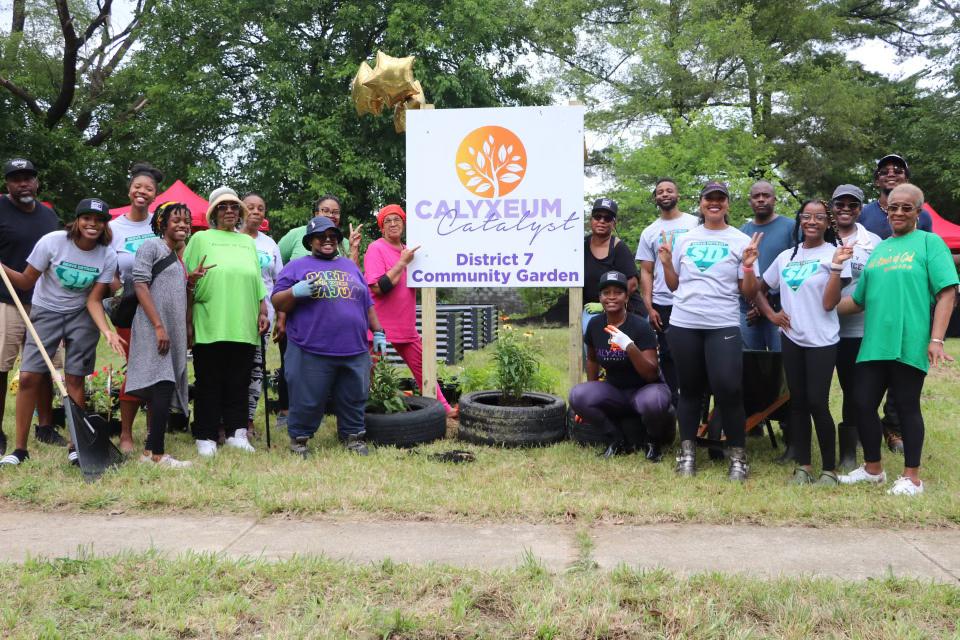

“To win this award is validating. The central goal of our business is to foster a caring, supportive community for our customers and staff alike. When the care that leadership puts into Aldea is reciprocated by our employees, it gives us the confidence that we are doing something right.”Andrew Boyd & Jeremy Miller, Owners, & Brittany Goode, Director of Operations, Aldea Coffee
“Winning the Good For Environment Award is a meaningful acknowledgment of the teams impact on creating nutritious soil and supporting environmental justice practices. This award is a reminder that small, consistent acts of restoration can shape a more equitable and sustainable future for Detroit. We hope our work inspires and compels folks to be environmentally conscious actors that care about doing good in their local ecology.” - Jøn Kent, CoFounder, Sanctuary Farms


“Winning the Good For Community Award means our efforts to uplift and invest in Detroit residents are being recognized and it fuels our drive to keep going. For us, this award represents shared success with our neighbors, volunteers, and partners who’ve believed in our mission.” - LaToyia Rucker, Program Coordinator, Calyxeum Catalyst







When you think about your pet’s wellness, it’s easy to focus solely on the food you’re placing in their bowl. However, true wellness encompasses a much broader spectrum, inclusive of nutrition, preventative care, oral health, exercise, mental stimulation and more.
This National Pet Wellness Month serves as an ideal reminder to examine your pet’s health. Consult with your veterinarian to customize a wellness plan to improve the longevity and overall quality of your pet’s life and consider these ideas from the experts at Swedencare, a leading pet health company, to play an active role in providing a happier, healthier life for your furry friend.
Focus on Prevention and Early Intervention
&tooling teams to assure minimum radii/draft, tooling &safety reqrmnts in compliance w/ U.S.,
&China standards. Bachelor, Transportation or
Design. 60 mos exp as Digital Sculptor,
While many think of preventative care as an annual vet visit, that is only the beginning. Those yearly checkups should include a thorough physical examination as well as necessary vaccinations, screening for potential parasites and age-related diseases and updated prescription medications – giving your veterinarian a chance to spot any potential problems early.
Based on the findings of the exam, you can work with your vet to create a prevention plan tailored to your pet’s health and risk factors, including recommendations for spaying or neutering, maintaining good oral health and adjusting their diet to ensure proper nutrition and a healthy weight.
Emphasize Nutrition as a Building Block for Health
A balanced diet complete with the necessary nutrients is the cornerstone of pet wellness. Work with your vet to provide a combination of protein, carbohydrates, fats, vitamins and minerals tailored to your four-legged family member’s species and life stage. Remember to review labels and certifications, choosing natural ingredients while avoiding artificial additives, fillers and preservatives.
Sometimes, even the best diets can leave nutritional gaps, however, and supplements can help fill voids and provide additional support for joint health, skin and coat condition, digestive function and dental health. Start small, swapping a regular treat for a functional dental bite, such as ProDen PlaqueOff Crunchy Dental Bites, which are formulated with clinically proven kelp to help support dental health and offer a Veterinary Oral Health Council stamp of approval for the dog version – offering owners an easy, reward-style supplement to fold into everyday routines.
Electrical, Computer, Mechatronics, or Mechanical Engrg. 12 mos exp as Engineer, testing or verifying embedded telematics &infotainment embedded ECUs, using Tc &vSpy tools, or related. Mail resume to Ref#407-1175, GM Global Mobility, 300 Renaissance Center, MC:482-C32-C66, Detroit, MI 48265. Senior Digital Sculptor Warren, MI, General Motors. Plan &perform advanced surfacing concepts &development of Class A surface of full vehicle exterior syss. Interpret &define design intent of designer while collaborating w/ engineering, packaging, human factors, &tooling teams. Design &develop 3D Class A surfaces of ICE, diesel, BEV &AV full vehicle psgr car, truck &SUV exterior cmpnts incl. front &rear fascias, grills, head/taillamps, doors, fenders, ABCD pillars, skid plates, liftgates, truck beds &detailed exterior cmpnts incl. door handles, mirrors, lamp internals &exhaust tips, using Autodesk Alias AutoStudio, Autodesk Maya, NX &VRED

Modeler, or related, designing or developing 3D Class A surfaces of full vehicle psgr vehicle exterior cmpnts incl. fascias, grills, head/taillamps, doors, fenders, ABCD pillars, &liftgates, using Alias AutoStudio, NX &VRED tools, for U.S., global &emerging markets, or related. Mail resume to Ref#1827-201, GM Global Mobility, 300 Renaissance Center, MC:482-C32-C66, Detroit, MI 48265. Warren, MI, General Motors. Plan &perform advanced surfacing concepts &development of Class A

Make Daily Movement a Priority Daily movement, whether through walks, playing, agility training or even using puzzle feeders, is critical for weight control and joint health. Regular activity also improves mood and helps prevent boredom-related behaviors – such as excessive meowing or barking, digging, clawing or chewing on furniture and more – according to the Foundation for Animal Care and Education.
The amount of exercise your pet needs can vary by species, breed and age. Some larger dog breeds may need multiple hours of activity per day, including walks or hikes and fetch sessions, while smaller dogs and cats may benefit from short, active play sessions throughout the day.
Don’t Overlook the Importance of Oral Health

Proper dental care is an important aspect of overall pet care and helps prevent plaque buildup, tartar accumulation and gum disease, all of which can affect your pet’s energy levels and organ health. Use National Pet Wellness Month to refresh their oral care routine with an option like ProDen PlaqueOff Crunchy Dental Bites. Easy to incorporate into any routine, these lowcalorie bites can be given daily alongside a pet’s regular dental care regimen. They contain the unique, natural and clinically proven kelp ingredient A.N ProDen to help reduce plaque and tartar buildup while keeping breath fresh all in a bite-sized, crunchy form with a tasty veggie flavor
Explore Mental Enrichment to Keep Pets Sharp
Mental stimulation is just as important as physical exercise for your pet. Engaging in training games, using interactive toys, conducting scent work and organizing social outings can boost cognitive function and help reduce stress.
Mental enrichment complements physical exercise and is particularly beneficial for older pets or during inclement weather when activities can be taken indoors.
Introducing a new walking route or adding a 5-minute training game to indoor playtime can make a difference in your pet’s happiness and overall well-being. Find more advice and products to help your pet live a long, healthy life at us. swedencare.com.
